Text
Umireread: Turn of the Golden Witch - Chapter 8: Wedding Ring
Sat, Oct 4 1986 - 10:00PM
The following contains spoilers for the entirety of Umineko. Please do not read if you are yet to finish it.

I know this isn’t the first time that Santa has been brought up in relation to fantasy vs reality, but it is a pretty apt comparison for the message of the story. No-one ever says that it’s cruel or immoral to lie to kids about there being a magical man who delivers presents around the world. If it wasn’t for the fact that they have to learn the truth eventually - since they’ll need to help perpetuate it for the next generation - would it be better if they spent their entire life believing it?
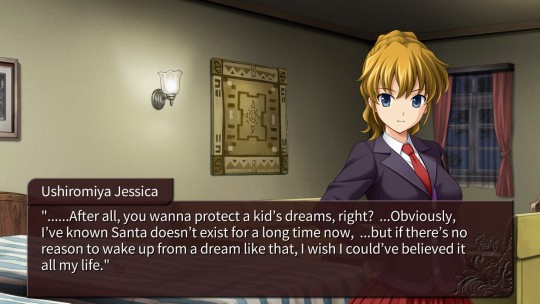
Case in point.

It’s interesting how much time they’re devoting to setting up devil proofs here - priming us for the introduction of the Red Truth and showing how many issues we’d have trying to solve the story without it.

Come on Ryukishi, you can’t just say “wow! I’d love to read a story about a child seeking revenge!” in your story about a child seeking revenge.

Episodes 1 and 2 dwelling so hard with the incorrect axiom of “the killer doesn’t want to be caught” really torpedoes the arguments that the characters are able to come up with. By now, it should be pretty reasonable to figure out that the killer wants to be caught - and that they want the Epitaph to be solved. But why? Is it possible to even construct a plausible theory for that at this point?

This scene is just oozing in the overall truth, isn’t it?

Very funny to see that “human woman” is in bold here, but not “single”. Don’t want to make the regular accomplices and the resulting roulette too obvious now. I’m sure Yasu is pleased to be perceived as a human woman, though.

You know, I’ll have to see how much this facet of Maria’s personality remains in the Tohya Forgeries, because this really isn’t doing it for me - and I’m wondering how much of it is down to this being Maria’s actual personality, and how much of it is down to Yasu focusing on that element of her.
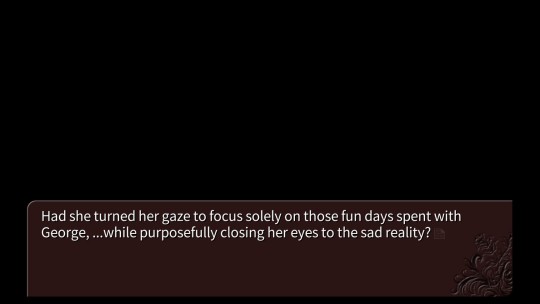
No comment necessary.
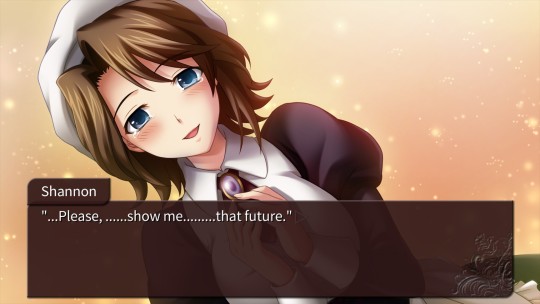
Echoing my former comments on how, regardless of how their relationship formed, you can’t deny how much it means to her.
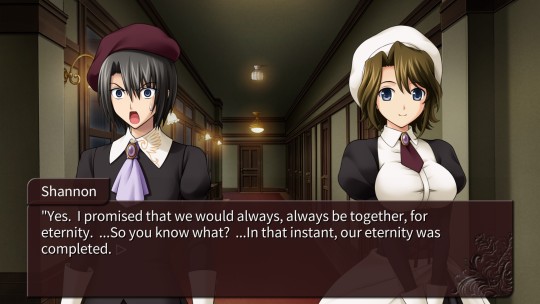
Shannon’s use of ずっとずっと here made my ears prick up - admittedly due to the immense amount of times that I’ve listened to Revelations. While it’s definitely too much of a stretch to link these together, I do find it interesting how the phrase is used here for “always, always” yet in Revelations it’s used as “again and again”. Of course, the latter translation is meaningless nonsense if you think of a single gameboard - but if you think about it over the wider Sea of Fragments?
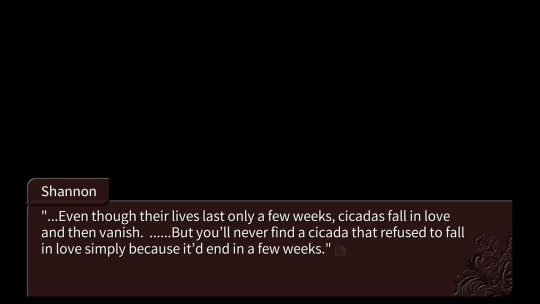
This is really interesting to compare to the philosophical discussion of the life of the wilting rose in Episode 1 - all the cousins talk about their thoughts on seeing the rose, being glad they could see them when they bloomed, but here Yasu is the one considering not how she feels about the Cicadas, but how they feel themselves. And isn’t that the actual important part of it all?

Okay - so this was going to happen eventually, but now is as good a time as any. Allow me to chime in on Umineko’s central theme of “love” as an asexual person.
I’ve alluded to how you can interpret Umineko as a criticism of heteronormativity before, but even at the core, Umineko is intrinsically connected with the base human instinct of love. I’d go as far to say that Ryukishi (at least, at the time of writing) wasn’t really aware of asexuality, and just assumed that experiencing love was a base part of the human condition that everyone experienced. Mildly amusing if so, since it means he too has fallen victim to building arguments on flawed axioms, while writing an entire tale about that very issue.
However, even as an asexual… I don’t mind this. I don’t feel seen by Umineko, but there’s a key component to how Umineko has been written that stops it from being entirely unrelatable: while Umineko dwells in romantic and sexual love, Ryukishi is writing with unrestrained love towards his fellow human beings. He’s writing with love towards the world he was born into. The world that we were born into. While he may not have done so intentionally, platonic love oozes from his work.
That’s why I can still resonate with the central message. Maybe I don’t love anyone in the way that Ryukishi expects I should. Maybe my body, too, is effectively furniture. But even still, I can love my fellow human for existing. I can love the joys that we can experience because we are alive. I can say thank you for being born - not just to others, but to myself. I can relate to that. And, honestly - I think everyone can. Maybe romantic love isn’t something that everyone can or will experience. But a general love to the world around them? I do think that might indeed be a universal part of the human experience.
…I’d love to leave this little aside there, wrapped up nicely in a bow, but I did have a bit of a gut punch at the “maybe I too am furniture” note - because, yeah, in hindsight, that might be directly aphobic. That might be the line that’s devalidating to asexuals. But, again, I don’t personally have a problem with that, because that concept is directly stated to be Yasu’s line of thinking - not a view that finds itself entirely endorsed or condemned by the narrative. Because it’s just what she thinks - and it’s up to you to decide how you want to feel about that. Yasu is hurting, her beliefs come from a place of trauma - I don’t feel invalidated by that. I just want the person who believes that to become better, to heal. I want to be able to love the human who lies behind that layer of unmitigated despair and agony. And, again, isn’t that ability to understand what Umineko is about?
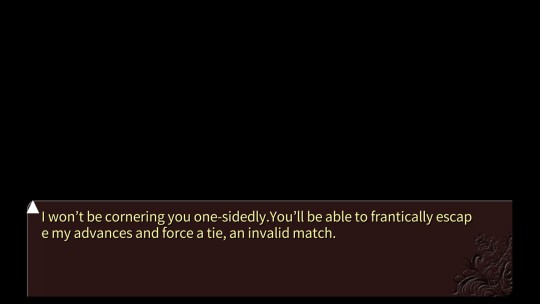
Once again, moving swiftly on from a deep dive to a more regular point of analysis. The concept of a “tie” in Beato’s game is an interesting remark - because how would that happen? Of course, with full knowledge, this is a board state where Yasu is caught and apprehended (all it takes is a lucky shot from one of the guns), but the Epitaph is not solved and the bombs still go off. But, if you don’t know that, how does a tie work in this game? You catch the culprit or you don’t. So this is a pretty strong hint towards Beato having a failsafe.
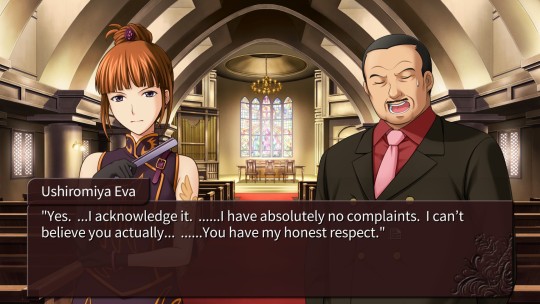
This is one of those scenes where I’m deeply curious about what’s going on behind the scenes. How much did Yasu reveal to the adults here? We know the chapel is connected to the secret room, so it’s very possible that she straight up showed them all the gold.
Actually, thinking about it, there’s an alternate solution for the First Twilight here, isn’t there? You could actually Red Truth that the door was locked, since we could have got in/out via the underground passage to Kuwadorian. Although of course, that doesn’t play nicely with Knox, even if we allude to the presence of a secret passage with the code in the chapel.

I’m going to be honest, I don’t actually remember them doing Role Calls after Episode 1. The first one stuck out to me a lot, but I guess the repeats didn’t leave as much of an impression.
No Kumasawa, Shannon, or Nanjo this time. Very interesting - we already know that the Role Calls are untrustworthy since we have Kinzo in the study, but even if you wanted to say “but that’s just his body”, we have Kanon in the corridor and Beato in the VIP room, so that’s an impossibility there. I’m going to rescind my Episode 1 remark about the missing people being those who are sleeping, and just flat out say that I don’t have any reasonable conjecture on why the people who aren’t in the Role Call are absent from it. Natsuhi’s absence in the first Episode torpedoes the idea of it being accomplices. Could not give you a single theory that connects these missing pieces together.

And time for the First Twilight… for the second time.
3 notes
·
View notes
Text
Umireread - Turn of the Golden Witch: Chapter 7: 'Furniture' and 'People'
Sat, Oct 4 1986 - 6:00PM
The following contains spoilers for the entirety of Umineko. Please do not read if you are yet to finish it.
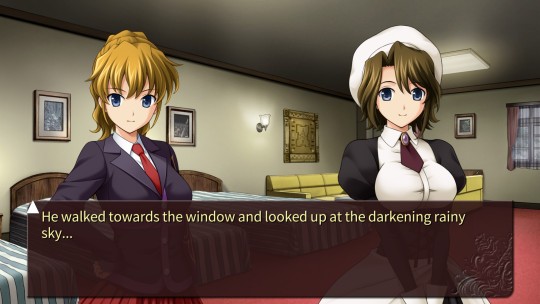
Is the sky worsening? Or is the mood? With the talk of blue and grey skies, could the typhoon not just be a plot device to facilitate the classic setting of a murder mystery, but relevant to the deeper commentary of perception as a whole?
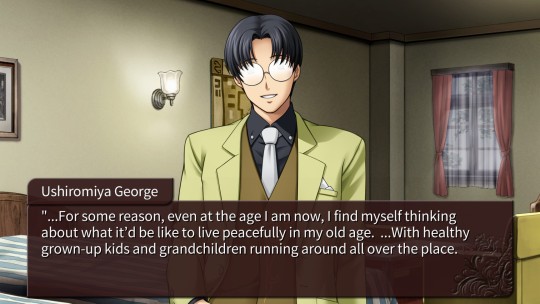
Poor Yasu. It must hurt a lot whenever she hears about George’s eventual dreams and desires and how they’re incompatible with her. The reality of the situation setting in, I suppose.
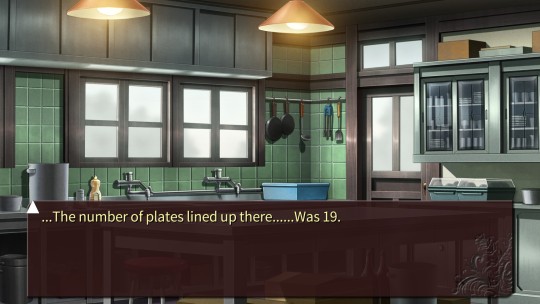
We’ve talked about finding joy in the mundane, and I do find myself wondering about the silly details of reality that don’t get addressed here. Who’s eating all the extra meals that get made? I presume whoever takes Kinzo’s meal to the study gets his, Yasu probably has to eat for both Kanon and Shannon whenever Gohda is cooking for everyone (since they can just cook a single meal and pretend both Kanon and Shannon has eaten when they do it themselves), but how are they handling Beatrice’s meal? Is Yasu eating all three? Are they throwing the food somewhere and hoping no-one finds it? This is one of those things that really doesn’t matter, but is fun to think about.
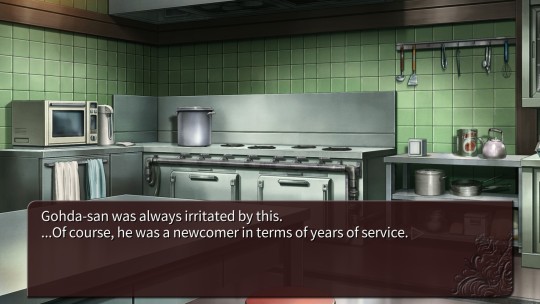
I do really love Gohda as an outsider to the servants - he adds a nice dynamic by not having everyone in the staff automatically being together on team Yasu. Thinking about it, I kind of wish we had more of a dynamic between Battler and Gohda, given they’re both “outsiders” to the family. I could see a natural bond happening there - and while the Ushiromiya tend to be naturally prideful and look down on the servants, we’ve already had scenes with George and Shannon falling for them, so there’s a precedent there for the new generation to look at them as humans rather than furniture.
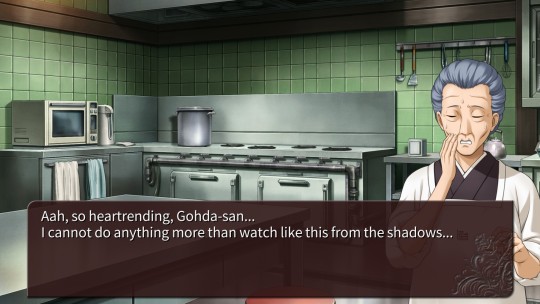
And Kumasawa’s at it again. Still not quite sure what to make of this.
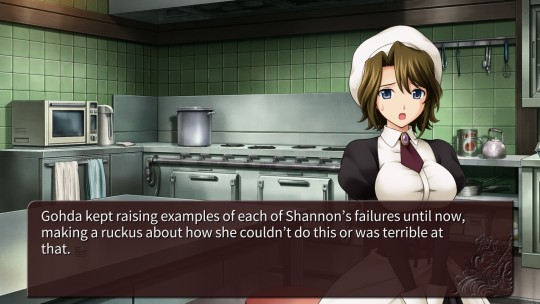
So this scene is interesting by itself - but it’s also another reflection on the absolute meaninglessness of tradition and seniority (even if it’s being done through Gohda’s tinted lens of desire). Is there something to be said about the western fascination detailed through the Ushiromiya being tied to a criticism of Japanese society unconditionally demanding respect for elders? This would be a pretty hot take for a fairly fundamental part of society, but I don’t think it’s inconceivable - we’ve already seen how Krauss, as the eldest, is easily the most incompetent of Kinzo’s children; and a good portion of the tale dwells in Kinzo’s sins as well. Perhaps, once again, Ryukishi’s past as a social worker has made him reconsider this axiom of society, given the amount of terrible elders he’s no doubt had the misfortune of encountering?
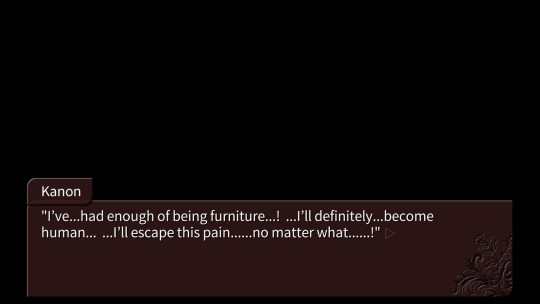
Another pretty heavy scene of Yasu questioning herself regarding the upcoming events of the night - although the phrasing of this “discreetly” taking place in the corner of the kitchen is rather amusing given how emotional Kanon is getting. Of course, if this was all taking place as an internal dialogue…
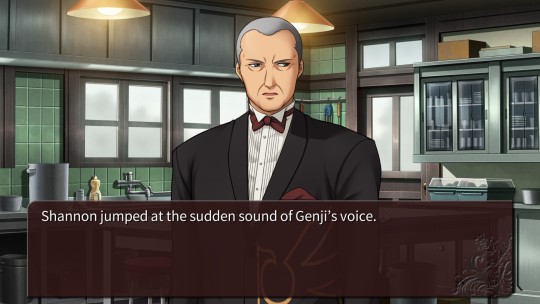
Yasu literally caught daydreaming, ha.
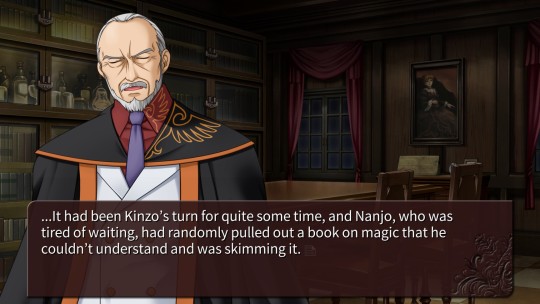
Can’t wait for the Nanjo black magic arc. I wonder if the book he picked up is one of the ones in a foreign language that he can’t read? Wouldn’t put it past him, if he’s sufficiently bored.
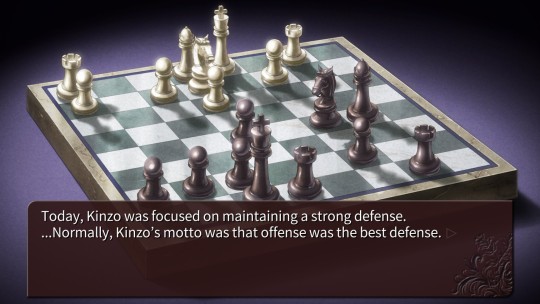
Interesting comment - is this reflective of Battler for this game?
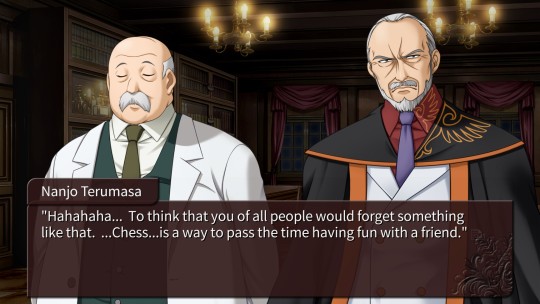
I think there’s something to be said about all the times that Umineko is stating the central message in the early episodes, but you’re not going to pick up on it while your brain is focused on solving the mystery. Kinzo talking about how chess is about having fun isn’t going to tell you who the culprit is, why the murders are happening, or reveal any new information - but that’s exactly what’s happening on the meta level, isn’t it?
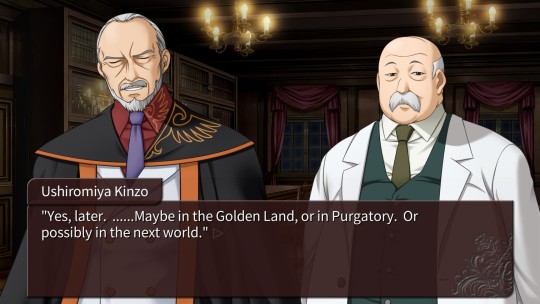
And we’re even literally talking about it going on in purgatory. It’s incredible how on the nose we can get at times.
It feels odd to ignore the Shannon-Beatrice scene here, but I’m withholding my thoughts on that. The inner monologue is inherently intensely complex, so it’ll be better suited to the Wake than a liveblog.
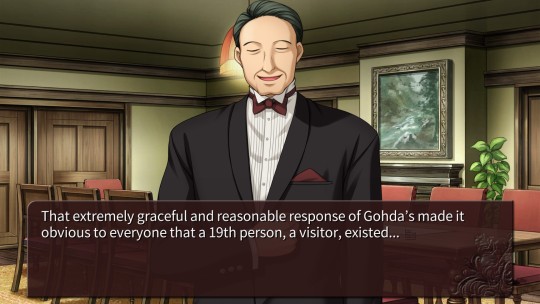
Another classic “Obvious” from Umineko.
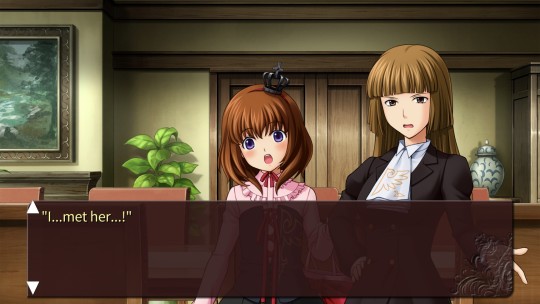
Gee, Rosa is saying this like she’s under gunpoint. I wonder if she’s been coerced into something.
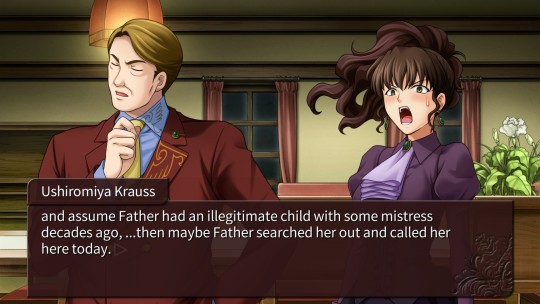
Well yeah, we have an entire Epitaph designed for that exact purpose.

There’s certainly something to be said about how the clock sound is the same one used for the guns being cocked. Quite a loaded concept, eh?
2 notes
·
View notes
Text
Umireread: Turn of the Golden Witch - Chapter 6: The Witch's Move
Sat, Oct 4 1986 - 1:00PM
The following contains spoilers for the entirety of Umineko. Please do not read if you are yet to finish it.

Interesting symbolism here, which you can take in multiple ways - is Beatrice the storm that is ruining the rose garden? The typhoon of misery encircling the family gathering? Or perhaps the thorns that adorn the Ushiromiya are so malevolent that it is karmic retribution for their prickly ways? Whatever the case, Yasu does seem to have a side of tenderness that causes her to pity the family - regardless of the angle that this pity is approached from.

Understandably, this scene is incredibly dense when it comes to deeper meanings. Episode 2 is focusing extensively on the dynamic of Yasu’s inner roster, so there’s a lot to unpack between their interactions.
The narrative comments that it’s as if Beatrice can read Kanon’s mind; which, of course, is fairly easy, since most people are equipped with the ability to read their own mind. The ensuing arguments between the two encapsulate the self doubt that is at play here, with Beatrice being fully on board with the plan for the Epitaph murders while Kanon does not believe in such a path forward - and of course, there’s the ever present sense that this will release them from being furniture. After all, the only way to stop being tainted by a body incapable of love is to have it lost entirely, blown to smithereens in such a way that no-one could ever reconstruct the mangled parts you once had. For those left behind, and those of the future, to assume you were “normal”; to assume you were human.

And of course, the aspect of Beatrice beats out that of Kanon, dictating how Yasu progresses from this point forward.
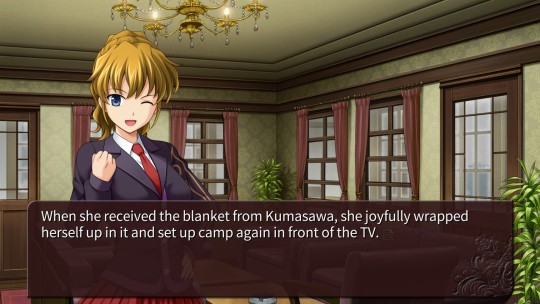
Glad to see Maria getting comfy. Always worth taking a moment to appreciate these moments of respite. I’m sure you can make a comment about the TV being fantasy for Maria to lose herself in - which, of course, is valid - but there’s still a truth that a small child has wrapped themselves up in a comfortable blanket and is having a lovely time; and those are the sorts of truths we should be making the most of.
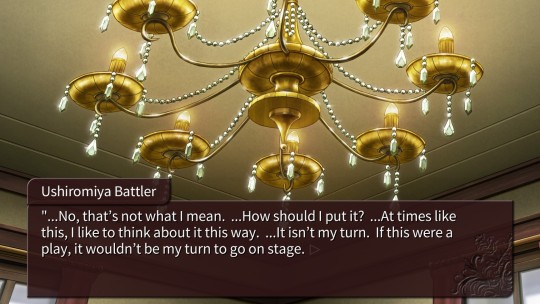
Amusing way to lampshade the current scenario - after all, it is indeed the Turn of the Golden Witch, and Battler is waiting for her to make her move.
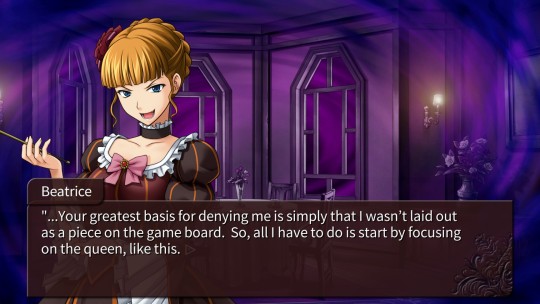
Ah, so now we’re addressing Beatrice’s arrival. I’m… not entirely sold on how they’ve handled this? I suppose we’re still easing into the concept of the Meta Layer over the gameboard, but these segments feel at their strongest when it’s as if they’ve paused what they were watching to commentate on what just happened. Waiting so long before returning here to talk about the developments feels less… engaging? I know it’s a problem that gets ironed out later, but I feel like we could have benefitted from jumping into this a little more readily.
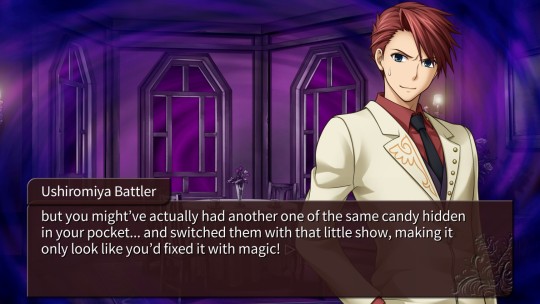
Well, Battler gets it in one, I suppose - but as we’ve alluded to already, Umineko is all about unlearning this response as the “right” one. A witch did it with magic, after all. It’ll be a long road for Battler to learn this, but a well earned one as a result.

Funny how they play with Yasu’s age - Kanon at 16, Shannon at 18, Beatrice at a bit over 20. I suppose the world is your oyster when you’re a late bloomer for puberty.
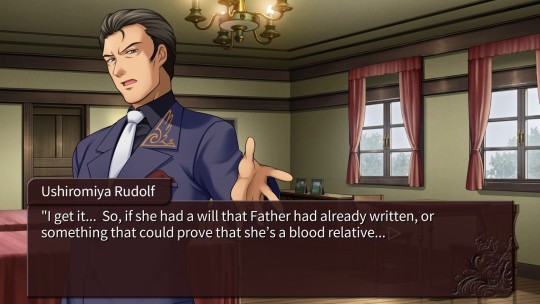
There’s something to be said for how one of Umineko’s core strengths is the way it addresses and causes you to reevaluate axiomatic thinking. All of the adults are so self centred that they’ve implicitly assumed that this new arrival must be there for money or recognition - why else would they have shown up? It has to be something to do with what they’re concerned with. But by all accepting this incorrect fact as a truth, they’re building on a foundation of incorrect axioms, ensuring their doom.

Little bit on the nose there.

Once again, whenever Umineko tells you something is “certain”, revisit the statement under a microscope. Check your axioms. Don’t be like the adults.

Another interesting scene - you can easily strip back the fantasy here, and this is just Rosa freaking out at the murder plan that she’s been drafted into. A perfectly understandable reaction, of course. It’s not like the family are all psychopaths who are willing to become cold blooded killers at the drop of a hat (well, maybe Kyrie and Rudolf are). It’s good to make sure we get to humanise them for the roles they’re forced to play.
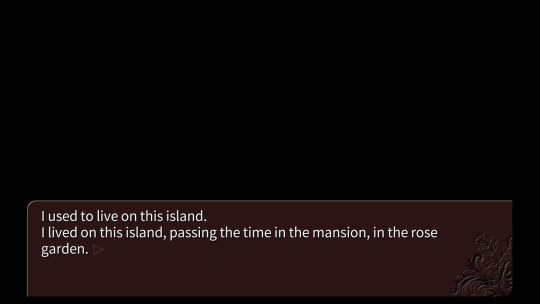
Oh yeah, Rosa must be DOUBLY freaked out given her past with Kuwadorian Beatrice. It’s not just what she’s been roped into, but the fact that the person who has roped her into it appears to be the same person she once killed. I’m surprised she’s still standing with the trauma this must be evoking in her.
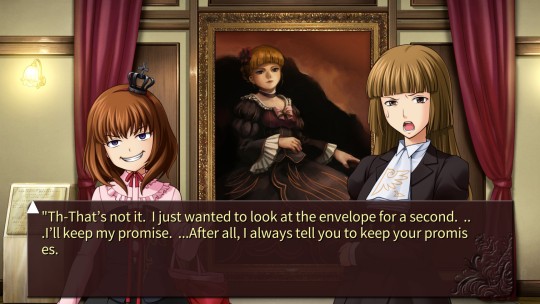
Well, if Episode 1 is anything to go by, Maria’s definitely took “keep your promises” to heart. I’m not sure I’d trust Rosa to be as honest and forthcoming, however.

I wonder if Maria having two “halves” is why she projects the same read onto Rosa? Using what she knows and understands to reason out that “normal Rosa loves me and bad Rosa shows up sometimes”.

End of chapter, progressing swiftly on.
5 notes
·
View notes
Text
Umireread: Turn of the Golden Witch - Chapter 5: Guest of Honor
Sat, Oct 4 1986 - 10:45AM
The following contains spoilers for the entirety of Umineko. Please do not read if you are yet to finish it.
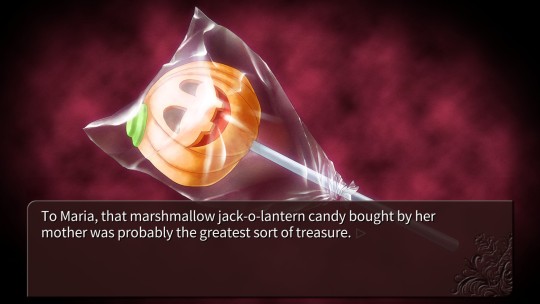
I think there’s something to be said about how childlike wonder is torn away from us as we grow. The world is a wonderful place - there’s a fantastic tumblr post that makes the rounds occasionally about how something as mundane as going to a shopping mall can be an unending source of wonder, if you cast away the veneer of normality and complacency that usually clouds us when we go. Maria has been handed a cheap, mass-manufactured sweet that is utterly inconsequential to most people. And yet to her, in her fantasy - in the bliss of her youth - it is the greatest sort of treasure. And because she believes in that, it becomes her reality.
To talk about myself again for a second - with occasional exceptions, I tend to split up my working day by going out almost every time for lunch. Working in town centre, there’s no shortage of places to grab a sandwich or something slightly more exotic. Of course, this is an expensive vice; I argue that, as I don’t drink alcohol or smoke, this is an acceptable money sink that would be comparable to either of those. However, nonetheless, it is a money sink. I would save a fairly substantial amount of money by preparing my own lunches, or foregoing them entirely.
And yet… I hadn’t really thought about it until now, but reflecting on this scene in particular, there’s a sense of whimsy to it that hasn’t eluded me even as I approach 30. Perhaps it’s because eating out was a special treat when I was younger - growing up relatively poor, we could only really afford to treat ourselves to a restaurant once a month or so - but there’s a sense of joy and elation there that hasn’t been eroded by routine. It’s the wonder that you can feel by attending a shopping mall, but we choose not to. That’s something that I, personally, can’t put a price on. And I’d encourage anyone reading to also find their own way to obtain the greatest sort of treasure from the most regular of scenarios.
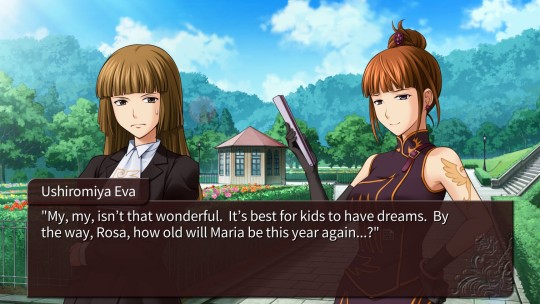
Eva Ushiromiya sees her chance to be a horrible person, and she takes it. Well, I suppose the entire family likes to deal with their own unresolved problems by taking it out on each other, at the end of the day.
Even if it’s only temporary, it’s nice seeing the adults being interested in Maria’s specific knowledge. Sure, maybe it’s insincere on their behalf, but to the kid who can’t distinguish the reality from the fantasy, that’s the absolute best feeling in the world. Being able to teach adults something that even they didn’t know feels great.

Criminy, Episode 2 is not letting up on this. I suppose that’s to be expected from the “Rosa” Episode, but still.
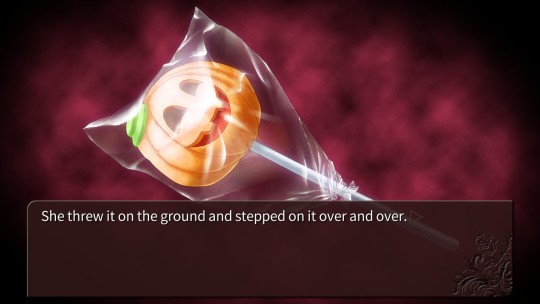
Rosa trampling on the hearts of everyone reading this Episode, old and new.

Hilarious subversion of the rose incident from Episode 1. Does it still count as dramatic irony if you’re lying about the truth by saying what happened in the previous game? I think it’s also worth highlighting this moment as another notch for suggesting that you should always be wary of what people say if it hasn’t been witnessed personally - we know that Rosa’s not telling the truth here, so what other falsehoods have we been fed thus far?

News just in: resident tragedy enjoyer loves how sad this scene is, and how much it hurts. More at 11.
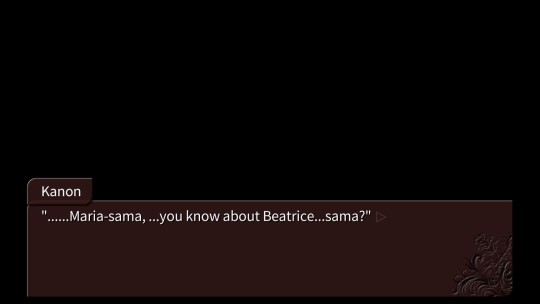
Very funny moment where Kanon goes “wait a second, I know how I can fix this for you.”

I’m constantly amused by how much Nanjo just doesn’t want to be in this novel at all. Does not enjoy going along with the family’s nonsense, doesn’t want to talk to any of them, does not want to get involved with the murders. I know Gohda is a community favourite for not really having anything important to contribute to the story, but I’m kind of digging Nanjo for similar reasons.

“Worthless” male pride, you say? Interesting commentary.
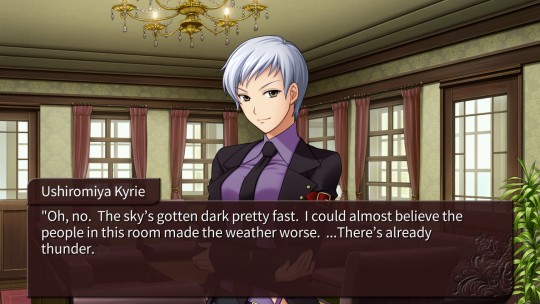
It’s almost like the people you surround yourself with could cause you to perceive the sky as grey instead of blue.
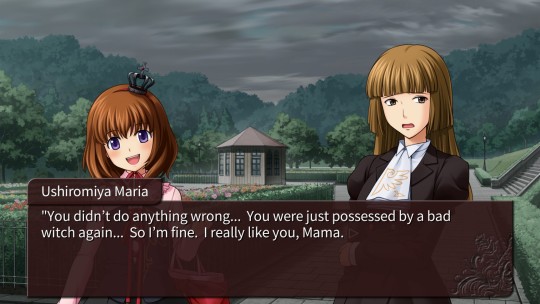
I don’t have an awful lot to add to these Maria-Rosa moments, but I can’t not acknowledge them. It’d be a crime to skim over such potent writing, even if there’s little for me to add that I haven’t said already.

An island detached from common sense and reality, you say? Sounds like the perfect setting for a new generation of fanfiction.

I don’t necessarily think this is a “with hindsight” moment because it’s still fairly clear what is going on here - you tell a child to close their eyes and then swap out the candy while they’re not looking. One of the oldest tricks in the book. What I do find interesting is how this parallels the final choice in Episode 8 - how do you approach this scene? Is this just a trick, because of course it is, or is this magic? Whatever you choose here, will you still hold the same opinion 6 episodes from now?
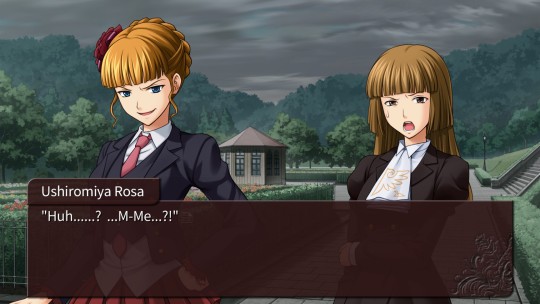
Obviously, this scene is noteworthy since you can read Rosa’s reactions as being uncomfortable with the blackmail forced upon her (using the term blackmail tenuously since she could arguably have been bought out without much threatening). But, with that in mind, I wonder when exactly she was roped into this? The adults at the guest house did say that she had been gone for quite a long time - we just assumed this was due to her being stuck with Maria, but did she actually visit the secret room with Yasu during this time?
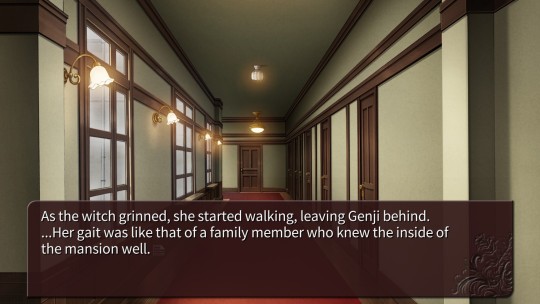
I’m sure she knows the inside of the mansion better than anyone.
The scene where Yasu as Beatrice meets Kyrie is really good, and I kind of wish we saw more of this in Umineko? I love the fantasy scenes a lot, but when you’re being presented with partial truths (that lean closer to fact than fiction) that are only slightly adorned with fantasy, they’re a lot more interesting to read than the ones that are drenched in outright fabrications.
Also, Yasu was born 30 years too early, she’d have made an absolute killing as an online voice actor with the way she can go between all these different personas without being found out.

Hey! New portrait!
One day I’ll be joining the hordes of Umineko fans by getting a giant framed picture of Beatrice for my house. I was kind of hoping that they would have been offered as rewards from the Umineko Gold Kickstarter… But we all know how that’s gone.
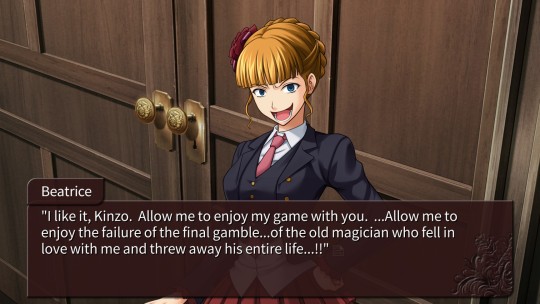
And so the reunion with Kinzo is delayed because he locked himself up in an anti-magic bunker. Of course, what we’re probably seeing here is Yasu considering the study as a base of operations, before realising that could cause some complications given Kinzo has been the opposite of alive for quite some time, and deciding to set up in the guest room instead where she doesn’t need to worry about dealing with matters arising from Krauss/Natsuhi/Jessica’s additional knowledge regarding Kinzo’s current status.

End of chapter! I kind of wish we had a meta section here for the moment when Beatrice’s piece arrived on the gameboard? It feels odd that Battler wouldn’t immediately jump on that with a “hey wait a second”. Alas!
5 notes
·
View notes
Text
Umireread: Turn of the Golden Witch - Chapter 4: Chessboard Preparations
Sat, Oct 4 1986
The following contains spoilers for the entirety of Umineko. Please do not read if you are yet to finish it.
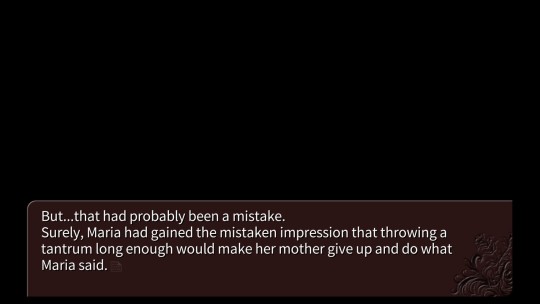
It feels odd to generalise Umineko too broadly, but I can’t help but feel there’s a sense of Episode 1 introducing the themes of fantasy in a mostly positive light, with Episode 2 looking to focus on adding nuance to the theme with well reasoned opposition. After all, if you kowtow to all of a child’s whims and delusions, they become spoiled and resistant to resistance. Rosa’s improper utilisation of fantasy with Maria has had clear repercussions; arguably, it may have made reality even worse for the both of them.

This one’s tough. Is Rosa wrong to be offended? …It feels like the intrinsic answer is yes, but I’m not so sure about that. There’s certainly something to be said about how even pure or innocent intentions can cause undue harm unto others. I suppose it falls back, again, to how feelings aren’t necessarily invalid just because they’ve been ‘reasoned’ incorrectly.

And now for our regularly scheduled child abuse.

It really can’t be understated how much your real life experiences are reflected in anything you write. Being able to speak and conjure voices from first hand accounts make everything feel so much more real. These scenes are always so uncomfortable to read, but you can tell they’re as powerful as they are because of Ryukishi’s history as a social worker.
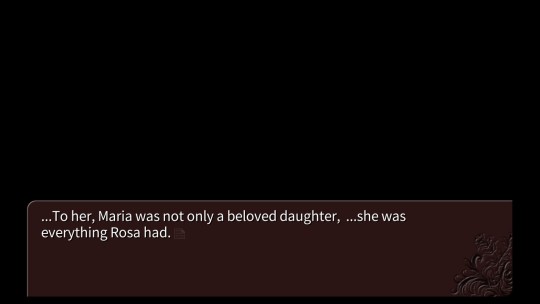
Again, even here - writing a scene like this is hard in the first place, but being able to add the appropriate nuance of the abuse - Rosa’s heartfelt reaction as if it were involuntary - really makes it sing.
Knowing how Episode 2 ends adds such an extra layer to this as well, because we can juxtapose what’s going on here with Rosa’s true, limitless love for her daughter. Also man I can’t wait to dig into worldenddominator again.

What a reaction to your WIFE, Krauss! Clearly a marriage of love, this one.
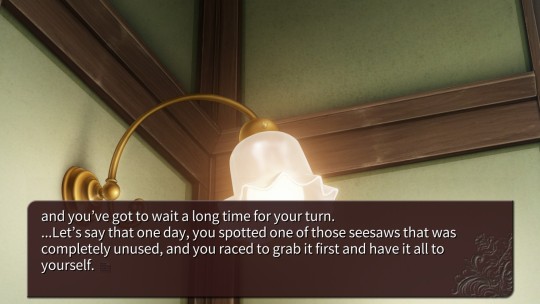
Ryukishi is channelling a little too much Victor Hugo with how much he likes to go off and explain random concepts that he knows about and wants to teach to us all. Thanks for the economics lesson, but let’s be real, this is ultimately fairly unimportant to the overall plot and/or message.

Natsuhi engaging in some casual magic with Krauss here, because that statement is most certainly not grounded in any sort of reality.

This is funny every time it happens. And they go on to say that Genji and Nanjo are on their side immediately afterwards.
As someone who didn’t figure out the “Kinzo was dead all along” twist before it was revealed, I can only imagine what it must be like to have worked it out by the end of Episode 2, only to be whammed by the scene of him attending the dining room in Episode 4.

Hi Gohda!

It’s interesting how many things were left to fate for this. You can’t exactly plan for things like a typhoon to coincide with the date of the conference. I wonder how many elements would have to fall through for Yasu to decide to call it off? Or would she be committing to this no matter what?
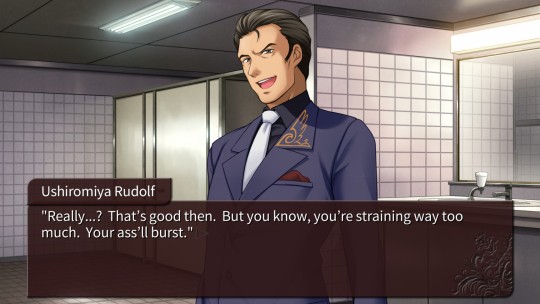
Rudolf seems like the type of person to pick the urinal next to you and then compliment you on your manhood.
If nothing else, it’s clear to see where Battler got his charisma from.

It’s wild how long it takes us to get back to Battler in Episode 2. That was nearly 5 full chapters, if you include the prologue.
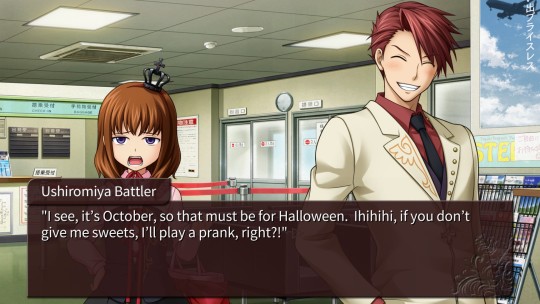
Very fun how a lot of this scene is taken from Episode 1, feeling almost like a direct one-to-one recreation, but then you get hit with the halloween motif from Maria to make you realise that something’s up.
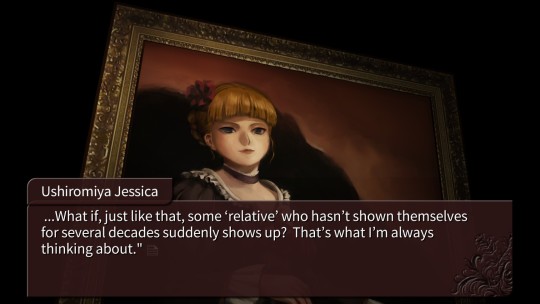
Like some sort of man from 19 years ago, perhaps?
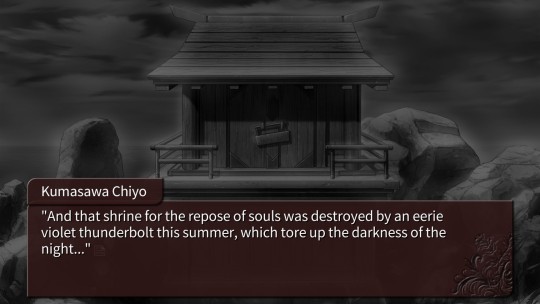
So the shrine was destroyed a few months prior to the meeting - I suppose that means either our thoughts about the symbolism in the prologue are wrong, or the whole thing took place over the span of a few months. On the one hand, that’s not too unreasonable of a suggestion - it means George would have ran quick into a marriage proposal, but it’s not like Eva wasn’t trying to do that to him already. On the other hand, we have the supposed Kinzo appearance and George still being at college, so I’m more inclined to discard our initial thoughts about the breaking of the mirror being a representation of the bombs being tested. A shame if so.

I know it’s because they were meant to look like regular business offices, but the background here really feels like the scenery of a Yakuza office. That wouldn’t feel too off for Rudolf’s characterisation, honestly. Actually, being blunt, it makes you think about the importance of some characters having the one winged eagle tattooed onto them; similar to the earlier point about the guns, it’s easy to overlook as a westerner, but for the mid-80s the Yakuza connotation of the tattoos would be very prevalent. I wonder how much Ryukishi actually wanted to lean into this idea of a shady side of the Ushiromiya - I suppose it wouldn’t be much different from his work with the Sonozaki in Higurashi, though.

Rudolf channelling his inner Battler by being forward with great confidence without any real evidence to back him up.

Poor Ange. I suppose she had just been born before the conference six years ago, but still, it must feel bad reading these notebook fragments about how all your cousins were complete again without you.
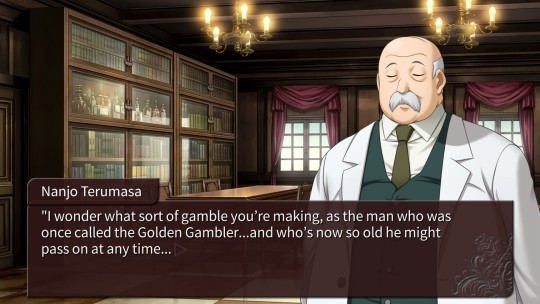
Is this a case of Nanjo ruminating to himself about the Epitaph? Moreso, regarding Yasu’s plans to use it?

I love how they’re playing with characters interpreting the sea and sky colours all differently. Honestly, it’s interesting to note that the Alchemist sprites have most of the Ushiromiya family’s eyes as grey, and yet Beatrice’s are blue. Even if that’s not part of the original tale, isn’t that a beautiful detail?

Tohya will read and write these tales for as long as he needs to. Endlessly, if required.

It’s shocking how long it takes us to actually get to this part, but nevertheless - Game 2 is afoot.
5 notes
·
View notes
Text
Umireread: Turn of the Golden Witch - Chapter 3: School Cultural Festival
The following contains spoilers for the entirety of Umineko. Please do not read if you are yet to finish it.

Shannon actively suggesting that Jessica should pursue Kanon is extremely interesting - is Yasu giddy from her feelings with George that she’s pushing even further for the feeling of being loved? Does she want to explore that aspect of herself even more, or try and convince her cynical side that even they are worthy of love?

Yasu is really out of her shell here. It’s honestly really nice to see.
Even if this is Yasu using the Shannon persona as a way to fake this kind of personality, there’s a lot to be said about “fake it til you make it” being a legitimate way to combat and overcome trauma. I faced a significant challenge to my mental health during my university years, and the only thing which actively helped me recover from my depression was indulging in a faux confidence that I was the coolest person in the world. Even if I didn’t actually believe it, that faux confidence turned into actual confidence, and here I am living a better, happy life because of it. There’s a good friend of mine who has an almost identical story to that. Yasu experimenting with and exhibiting these traits through her personas is absolutely a boon for her - and hey, it’s yet another example of how Fantasy can have a positive effect on reality.

Highlighting this as another case where the story is reinforcing the idea that Shannon’s love bloomed out of her environment rather than her personal desires. I suppose we could peel back a layer here and see this as a broader commentary on nature versus nurture - that might be worth keeping in mind as we look at Maria and Rosa later on.
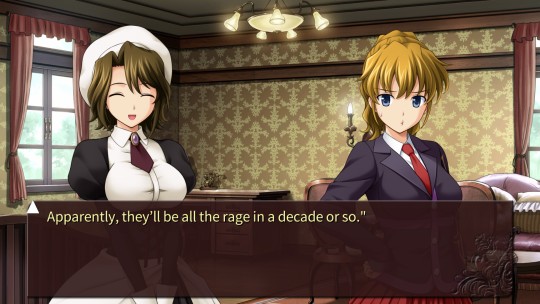
Truly, Umineko is a love story between Ryukishi and his anachronistic references. Or the When They Cry series as a whole, rather.

Very funny assist from Yasu here. It’s kind of cute seeing how much she wants to do this.
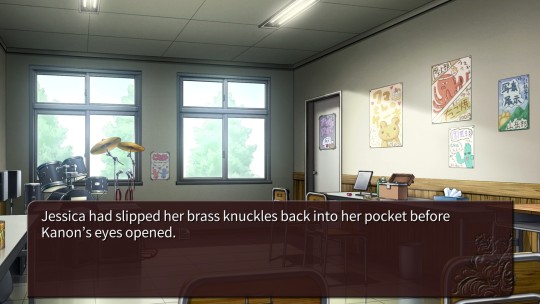
*mortal stampede starts playing*
Honestly? I love how this is set up as a joke, before becoming far more relevant later. I’m a sucker for foreshadowing that’s cleverly snuck past you at the start.
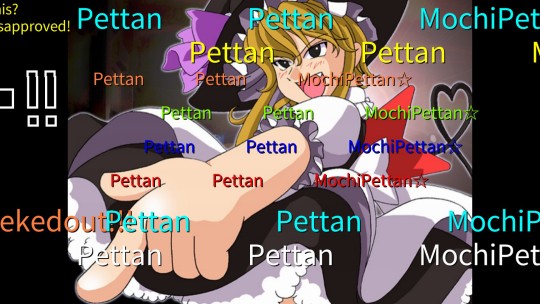
I’m a sucker for the Nico Nico Douga style text here. This is truly one of the places where the original version of Umineko is unmatched.
So, putting aside the anachronistic Marisa Cosplay and the censorship in more recent versions of Umineko (for what I presume are copyright reasons) - I really need to highlight the specific use of Tsurupettan here. Sure, it’s a cute reference since the song itself references Higurashi (Oyashiro-sama is stalking and all that) - but isn’t it apt?
Indulge me for a moment. Here is Yasu, dragged out of her comfort zone, trying to broaden the shell of one of her most cynical personas. Consider her insecurities - about how her sexual underdevelopment has caused her so much pain and suffering, how she’s resigned herself to the level of furniture. And here’s Jessica singing a song about a flat chested girl. There is no way that Yasu is oblivious to this; the song choice is too on the nose for the deeper notes at play here.
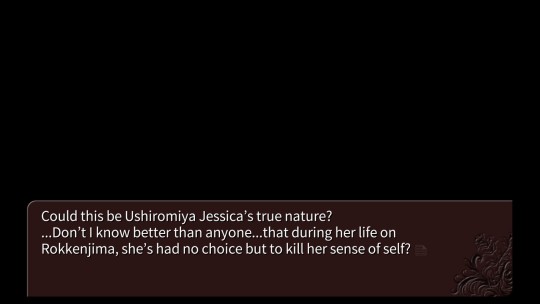
You would absolutely know better than anyone about having to kill your sense of self on Rokkenjima, Yasu.
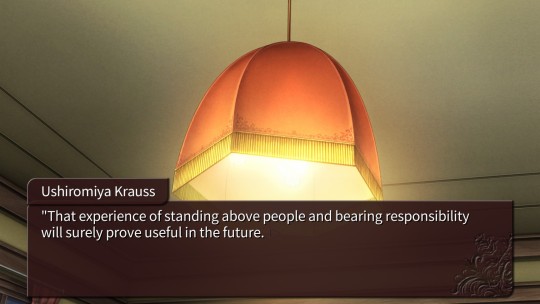
This is a very telling line for Krauss’ philosophy. Having experience “Standing above people” - considering yourself as superior to them - is painted in a positive light. The Ushiromiya are superior by birthright, a fantasy masquerading as fact that is not to be questioned.

You know, like how a person might develop a persona of Beatrice inside of them that has no inhibitions. Although, to be frank, Yasu’s development of Shannon might be the more appropriate parallel to draw here. Regardless, I do enjoy how they’re exploring such a key facet of Yasu’s personality through other people doing this.
It’s also interesting to note that Jessica makes a point to say that she’s not escaping from reality just a few lines later - again, the point of fantasy wielded in this form is not to replace reality, but to make it more bearable.

Laying the irony on here quite thick - albeit not in a way you’d catch it on an initial read.
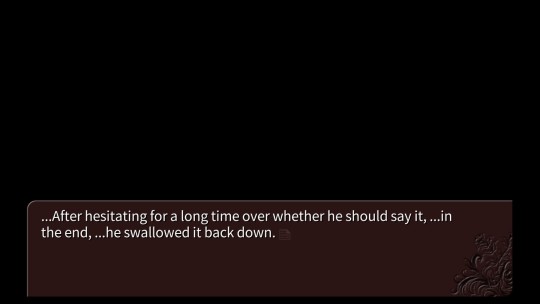
I suppose it’s much easier for Yasu to give out a real name as Shannon than it is as Kanon. I wonder if she’s thought about giving Kanon a “true name”, or whether this would have been a confession as Yasuda?

The Shannon-Kanon divide is really interesting; we have one persona who, knowing full well that it’ll end poorly, has opted for a “better to have loved and lost” scenario by entering a doomed romance; and another who refuses to let things progress that far and avoid future misery at the cost of missing out on temporary joy.
Notably, I think the existence of the Rokkenjima Massacre puts a very important spin on this idea. While the whole “love and lost” philosophy is interesting in a vacuum, considered over an entire lifespan - that’s not what we have here. Shannon and Kanon, alongside their would-be lovers, are all going to die before things ever progress to that fail state. So Kanon is trying to avoid a heartache that will never come - and Shannon has engaged in a love that is ended by untimely demise rather than incompatibility. That borrowed joy has lost the expected downside; from a game theory perspective, there’s no question that she made the right choice, right?
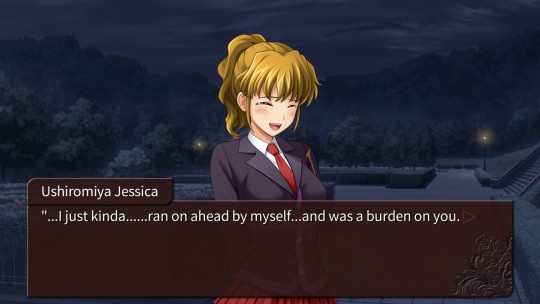
Said it before, I’ll say it again, Jessica’s suffering does a real number on my heart. I really feel her pain on this.

This one’s hilarious - an internal monologue of “hey if you’d been more extroverted like my other personalities then we could have had some polyamory going on here”
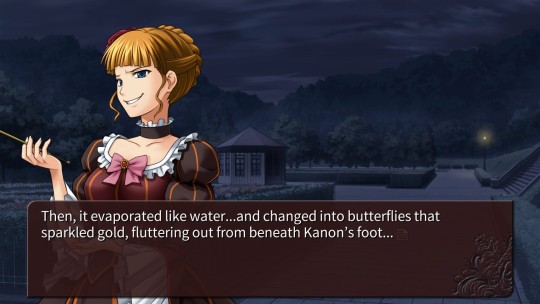
I’m also fairly ambivalent about the significance of the Golden Brooch here. Even with the knowledge of the whole story, I’m not sure I can see any meaning behind it beyond it just being a potential lucky charm that Yasu may have used; a wish upon one of her few nice possessions that she cherished upon seeing good fortune bestowed upon her afterwards. I’m not sure how many nice things Yasu would realistically have - I know they’ve mentioned that the servants are paid reasonably well, to the point that most move on after three years (yet she’s been here for ten), but I’m not sure how indulgent she is with her savings.
Of course, Kanon breaking the brooch is significant in the sense that one aspect of Yasu is acting destructively towards another of her aspects - trampling upon a possession that had otherwise brought her happiness. Of course, this pales in comparison to how destructive Beatrice has been to Yasu, but if nothing else it’s indicative of how much her different thoughts and beliefs are at odds with one another. Everything she desires cannot coexist in harmony. Outside of the Golden Land, at least.
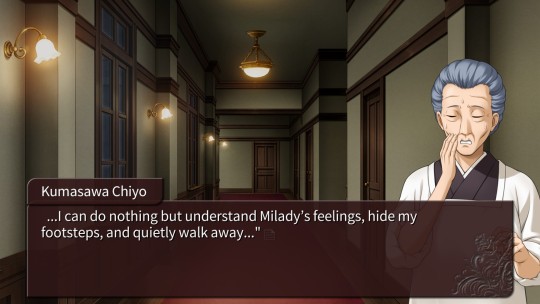
Kumasawa does this a lot and I’m not entirely sure that it’s warranted. I like her “acting” persona but it’s weird when she shows up at the tail end of a serious scene to go “uwawawawa, how sad”. I think I’d prefer it if she had a serious heart to heart with one of the other servants rather than just monologue meaninglessly?
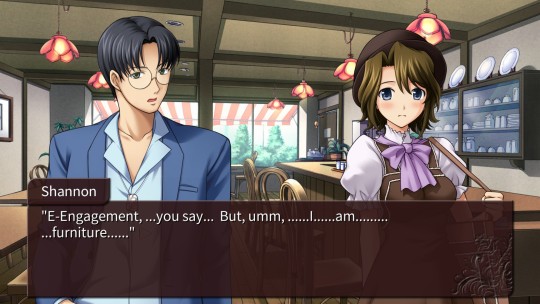
This is quite a big moment for Yasu, and honestly, I feel like it causes her to crumble even more than the Kanon-Beatrice moment we just had with Jessica. She’s built up this fantasy of a normal relationship, she’s enjoying her time with George, she smiles while thinking about the future of having a “normal” domestic life as a wife and mother. But, with the offer of engagement, it becomes real - she has to deal with the fact that she’s now barreling towards a future she envisioned in an idealised daydream, but one that is ultimately incompatible with the reality of the world. I think calling it a joke taken too far would be too mean towards the relationship with George, but I do think there’s an appropriate sentiment there where this is taking her beyond what she was comfortable with. The days of the Wonderful Utopia are over.

Opting to close us out on Life’s End for a grand total of like 5 lines is a WILD choice. It’s such an ominous song, and the start of it is just latin chanting before the music even kicks in. I legitimately don’t understand the creative decision here. Definitely should have used something else and saved Life’s End for a first appearance in something punchier.
4 notes
·
View notes
Text
Umireread: Turn of the Golden Witch: Chapter 2 - Wonderful Utopia
The following contains spoilers for the entirety of Umineko. Please do not read if you are yet to finish it.
This is a promising chapter name. I presume we’re in for quite the fantastical time, then?
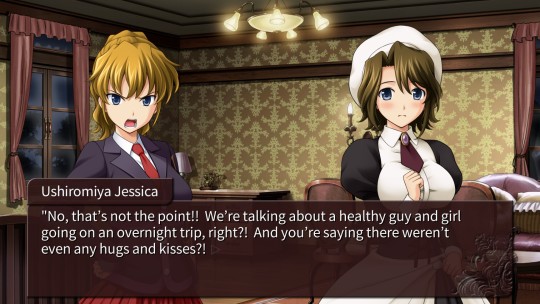
Not content to just monopolise the scream market, Jessica’s VA corners the funny market with an extremely exaggerated read on hugs and kisses. I honestly couldn’t imagine reading this without the voice acting.
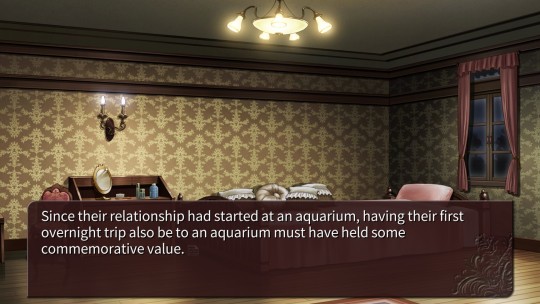
Ah, I suppose the scene we opened on wasn’t the first time she saw an aquarium then - although it does say something that she can go on that date again and have it feel like the first time. Young love, eh?
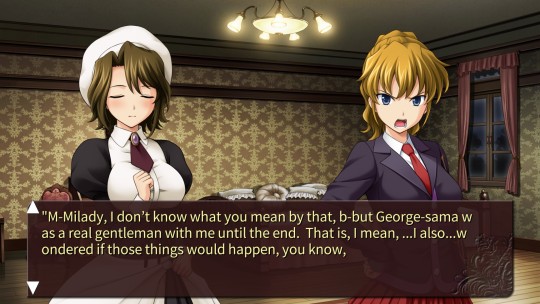
This is an interesting one to think about - Yasu definitely wouldn’t have seen this in a positive light. I can’t help but wonder where things would be if George had tried to be a little more forceful.
I suppose this falls more towards a Bern-esque hypothetical that rips the guts out of the characters for the sake of a story - the answer would be that a fundamentally different George erases the human that Ryukishi has built up inside him, and the plot effectively doesn’t happen with an early exposure of Yasu as Furniture.

God man. I love Jessica so much. My heart really breaks for her all the time.
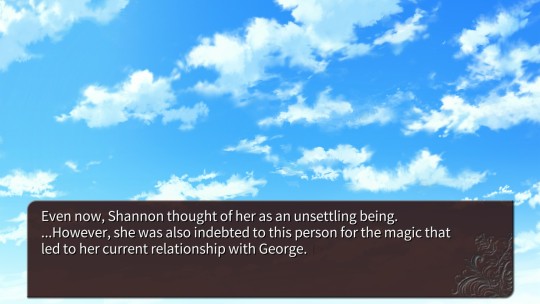
Yasu is unsettled by how extreme her Beatrice persona is, the lengths she has forced her to go to revoke her status as Furniture - but none of this would have been possible without that very forceful push to destroy the status quo.
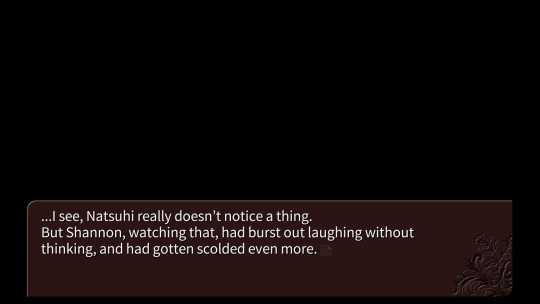
I, too, loved having my imaginary friends mess around with others when I was younger.

I’m… pretty ambivalent towards all this discussion of the mirror and the torii shrine? I’m not seeing much of a deeper meaning here - beyond the initial assumption of it being the adornment of the test of the bombs - so all the framing of it as a magic sealing mirror that stopped Beatrice from existing falls flat for me. The fact that it’s discussed in this much detail makes me think I might be missing something here, but I’m starting to suspect that it is just intentional misdirection.
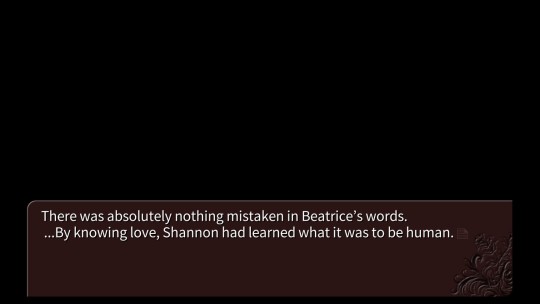
I remember being extremely bored at the start of Episode 2 on my first read, but man, it’s really out for blood with anyone rereading it. It shouldn’t be much of a surprise that the sections focusing so heavily on ‘Furniture’ hit harder once you know the connotations behind it, but man.
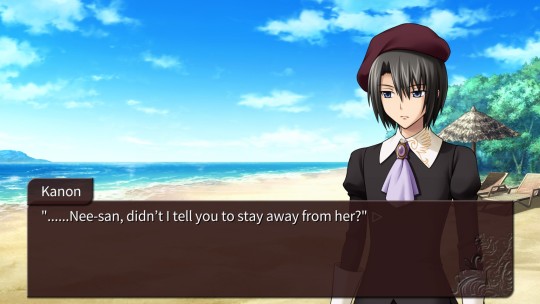
We have an angel and a devil on the shoulders here - one of them is telling you to abandon the concepts of love and be content to live a pitiful existence as furniture, and the other is telling you to kill everyone in the world.
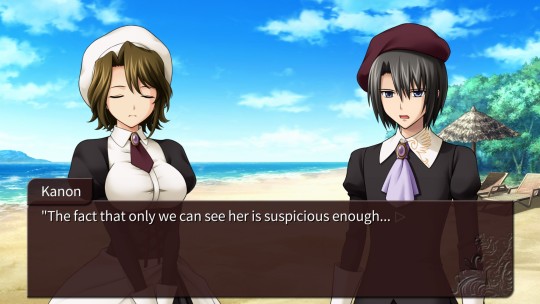
We’re just lampshading that here and now, I see?

While I suppose we’ve already dug into a lot of the framing of fantasy and reality in Episode 1, Episode 2 sure is starting strong with it here. Maybe things are terrible. Maybe life is pain. But if you believe hard enough - you convince yourself of the fantasy, you seek out the magic - the sea can be deep blue to you too.
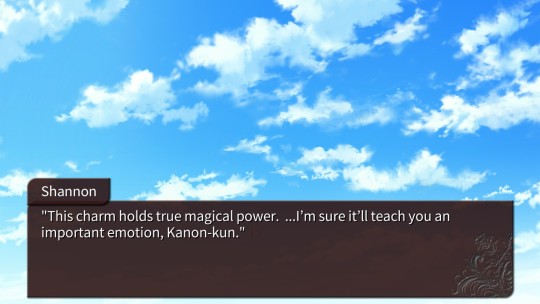
It’s interesting seeing all these conversations through the lens of internal dialogue - of Yasu convincing herself of things, swayed by her many aspects - but for the most part there’s not much to add beyond acknowledging it. This is a great scene, but it mostly speaks for itself, you know?

Umineko and NieR: Automata sit in a very questionable hall of fame where they make a poignant scene comedic by censoring the word “love” and letting our immature minds fill it in with any other four letter word we desire.
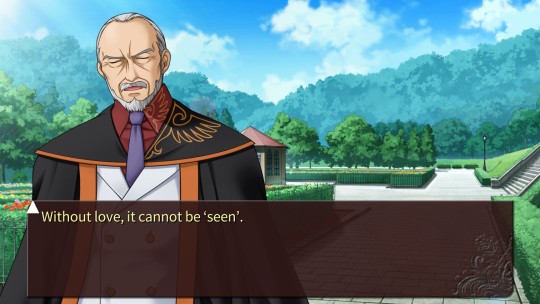
Over a million words to comprehend the meaning of a single sentence. It sounds insane, but it’s so worth it.

It’s really weird seeing Kinzo outside of the study. His sprite feels so out of place on a sunny day.

There’s a few moments of disconnect here where the sprites are yet to change to the emotion that the text is describing, which gives you odd combinations like this.
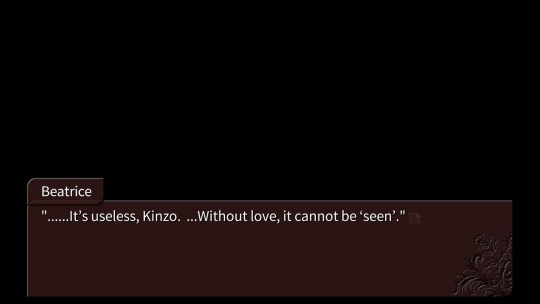
The answer was there all along Kinzo, you just had to make an imaginary girlfriend and pretend Beatrice was still there with you.
…I jest about that, but come to think of it, isn’t that partially the truth? The servants make a point about how they buy into the illusion of the Witch for Kinzo’s sake. I know that’s partially a hint towards Yasu’s existence, but I can’t help but wonder if that’s part of it as well. Of course, mandating servants to indulge in your fantasies means they are not treating them with love, but with compulsion; and, as hard as you try, you cannot obtain magic by sheer compulsion. Kinzo’s many years as a sorcerer are more than proof of that.

I feel a little underwhelmed by the chapter name being “Wonderful Utopia”. I suppose it’s reflective of Yasu’s honeymoon period following the establishment of Beatrice, where she can enjoy the temporary joys afforded by a relationship with George, but I think I was expecting something a little more… juicy, I suppose. Ah well, it’s not like we’re leaving the flashback period any time soon.
4 notes
·
View notes
Text
Umireread: Turn of the Golden Witch - Chapter 1: 'Furniture'
The following contains spoilers for the entirety of Umineko. Please do not read if you are yet to finish it.

And so Episode 2 starts… With a flashback inside of a flashback! Umineko is my favourite slice of life story.

That’s a very loaded statement when the broader implications are considered. On the one hand, there’s the gender identity angle, with Yasu considering herself a normal girl (to which we say, hell yeah), but it’s also batting away the notion of furniture which we know to be abnormal (in the sense of being non-human). Either way, considering what she’s been through, Yasu being able to view herself as “normal”, even if it has to be through the lens of Shannon, is pretty heartwarming.
Oh, and sure enough, the notions of furniture are mentioned 5 seconds later. I’m always relatively pleased when a line of thinking I have is immediately reinforced by the plot once I continue.
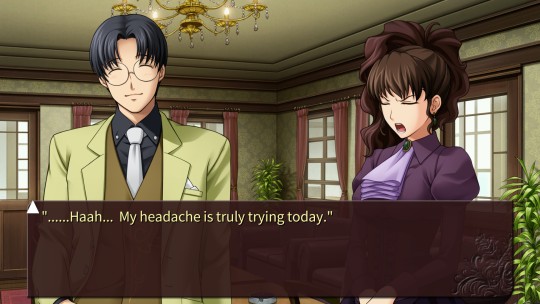
So there was a pretty rapid succession of thoughts here - the immediate reaction was “here we go, Yasu’s at it again”, but then I took into account that this isn’t necessarily in the realm of the message bottle, so this could just be a scene that was entirely reality. But then I realised that we’re in Shannon’s POV, so yeah this is entirely Yasu exacerbating Natsuhi’s pain once again.
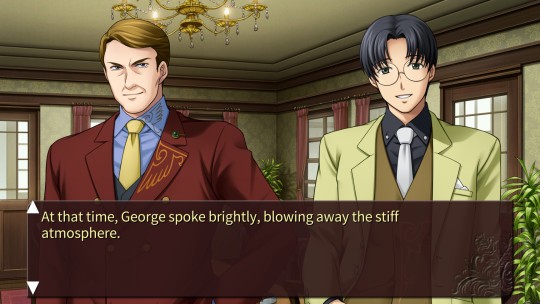
So far we’re getting a healthy amount of suggestion that, romantically, George was just “there”; that Shannon’s feelings for him didn’t particularly develop due to his character, but rather for just being an eligible option in the right place at the right time (similar to how Jessica saw Kanon).

Do they, though? My mind wanders to the many tales of how fake sommeliers can convince wine tasters of unusual methods of appreciating the wine; how people just assume a several hundred dollar bottle of wine must taste nicer than a cheaper vintage, when the difference could be entirely miniscule. Your perception is muddied by what you inherently believe must be the truth. It seems like an odd thing to focus in on - a rich family having expensive tastes - but when Umineko is so concerned about reevaluating your axioms, questioning why you believe the things you do, this does feel like another microcosm of the plot.
Meanwhile, Krauss joins in with Eva to bully Natsuhi regarding her headaches. An indication that the Ushiromiya blood is closer with each other than the borrowed wombs they parlay with? Or another case of Yasu inflicting as much misery onto Natsuhi via the narrative as possible?
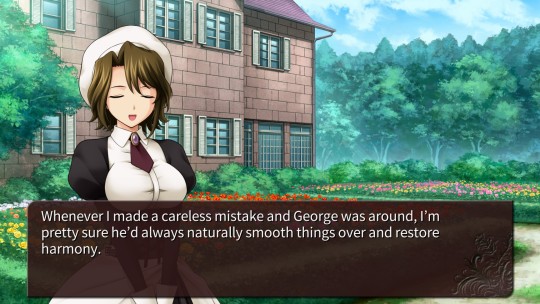
“Pretty sure” is a funny phrase to use here - it’s meaningless at a glance, but once again, it’s hammering through the themes of glossing over reality with a layer of fantasy. Did he? Who knows. But we can believe he did to improve our view of him, can we not?

As someone who doesn’t remember the intricacies here particularly well, does JESSICA implant the ideas of romance into Shannon? That’s VERY interesting if so.
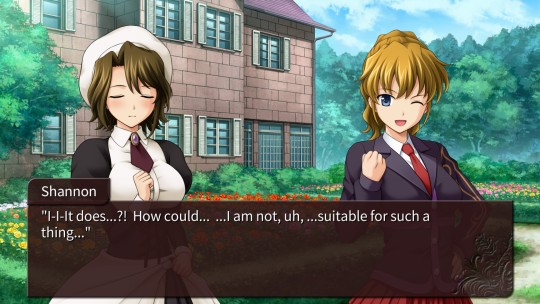
I suspect a good majority of early Episode 2 is going to be Ryukishi intentionally wounding anyone who is here for a re-read. The Furniture connotations hit hard.

And so the true villain of Umineko shows itself! Heteronormativity!
I’m using that term a little loosely - in truth, I should really be using the broader sense of “societal expectations”, since that’s the crux of what’s going on here. Shannon mentioned being a “normal” girl, but what does that mean, exactly? What is “normal”? Generally, a concept decided by the wider views of the society that surrounds us, rather than something derived from within. However, heteronormativity is a huge factor in the dangers of social expectations that Umineko highlights, as the expectation for people to enter a monogamous (straight) relationship, rampant in your teen years, can greatly shape and warp how you grow as a person.
You may think I’m talking from my own experiences there. You’d be right. You may be inclined to believe that heteronormativity greatly warped my sense of self, growing up as an asexual teenager who (at the time) thought they were strictly a cisgender male. You would also be right - I won’t be getting specifically into the personal issues I faced because of this, but you’ll definitely see a hard bias against the concept on my end (which, fortunately, Umineko also ensures to chastise).
This was a lot of words to say that “Jessica growing up believing she had to be a girly girl who likes boys warped her as a person and was the first domino in this ensuing tragedy”.

“If George were to appear at a time like that, she’d have no chance of keeping her cool.”
Anyway, here’s George.
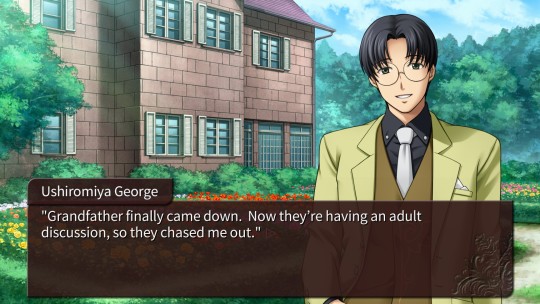
Did they, eh? The start of Episode 2 is fairly ambiguous when it comes to the place in the timeline, so it’s interesting getting details that can help pin it down. I’m hesitant to say that this is fabricated - there’s no way Eva would go along with a fake Kinzo appearance, so surely we’re at least 2 years back?

After mentioning generational trauma and the cyclical nature of abuse in the Episode 1 Wake, it definitely stands out more whenever the mentions of abuse crop up. Thanks Kinzo.

And here we are - THE moment that the feelings take root.
One thing which I think is important to address before we progress is the nature of Shannon’s feelings - I, personally, don’t like the Shannon-George dynamic, and a big part of it is this sense that she’s only pursuing him because she wants a “normal” romance in her life, and that the walking definition of milquetoast finds himself as the most eligible option in her position. She doesn’t love George, she loves the idea of George - and of course, that can develop over time, but that’s a questionable foundation.
But here’s the thing - does that matter?
There’s an excellent video from Philosophy Tube centred around Brexit (of all things), which raises a great point about people voting when they have been misled or deceived - while they have made an “incorrect” judgement based on what they knew, does that necessarily mean that vote is invalid? Are those feelings invalid?
In my personal opinion, yes - I’d say so. But as with most philosophical questions, a personal answer is not a true answer; my thoughts are not reflective of a greater truth of the universe. You can argue that, if someone is fed lies, and they make a vote based on those lies, then that vote is still perfectly legitimate. I might not agree with you, but the argument is there to be made.
I bring this up because it’s reflective of Shannon’s situation - because I think her feelings for George developed in the “wrong” way, I’m not supportive of the relationship. But does that matter? Shannon still has those feelings, regardless of how they developed. My preconceived notions cannot override that. As before, going forward, I’m likely to be critical of George and Shannon - but my distaste does not override their legitimacy. Anyway, moving forward.

Very funny to see the narrative also writing George off as “average”.

I think it’s worth mentioning heteronormativity again here in terms of George being influenced by it. Again, the choice word is “unfortunately” - completely telling of the expectations that George has thrust upon himself. He, too, is weighed down by society demanding that he enters a normal relationship; and that’s before any of the Ushiromiya expectations factor into it.
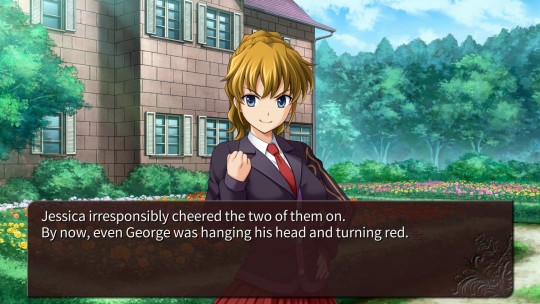
Highlighting the use of “Irresponsibly” here.
Honestly, this scene is actually kind of phenomenal on a reread - fueled by society at large, Jessica’s desire for romance causes her to ship George and Shannon together - pushing them close even when they may not have been otherwise - which in turn causes her to spiral and doom her away from Kanon. I am a sucker for tragedy and we are delivering right now.

And here we juxtapose societal expectations with familial. Not only is George expected to marry and start a family, he’s expected to enter a political arrangement, with him being used as a vessel for the Ushiromiya that cares not for the human behind his position. The former expectations twist and warp the human; the latter ignores it entirely. Which is worse?
Eva’s discussion about how she grew to love Hideyoshi rather than marrying because of it is an interesting parallel to the discussion we’ve just had regarding Shannon falling for George for just being there. It might just be my interpretation of it, but it feels like Umineko wants to paint that Eva-Hideyoshi dynamic as a negative thing, which is an interesting reflection of how it doesn’t seem to do the same for Shannon-George. But again, maybe that’s my preconceived notions tainting the scene - it very well might just be alluding to it while passing no judgement.

Not content to dehumanise just her own son, Eva has it out for the servant girl as well.
There’s a line here about George being in college and getting “wonderful grades”, so that probably places him at about 20-21? He was born in March, so that would have made him one of the youngest when he started school in April, so he’d have entered university at 18 and graduated at 21 or 22 depending on whether he went for a Bachelors or a Masters. So with Kinzo alive, we’re probably 2-3 years in the past?
I probably shouldn’t care about this too much - Ryukishi tends to play fast and loose with the span of time in his works (fall of the Soviet Union, anyone?) so trying to pin hard numbers on this is likely an exercise in futility.
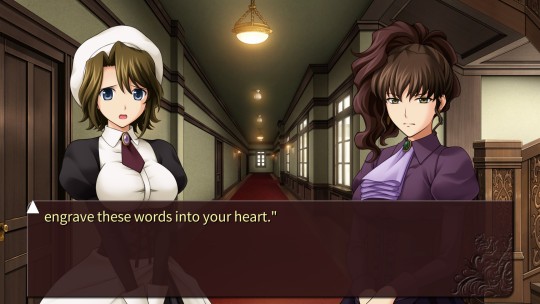
Interesting - engraving into your heart conjures the same phrasing that “Kinzo” gave Natsuhi during her study scene in Episode 1. A sly hint that such an exchange was fabricated by Natsuhi, given her use of the term here?

It’s interesting how the POV bounces back between “I” and a third person “Shannon”. Possibly Yasu taking time to distinguish or dehumanise herself?
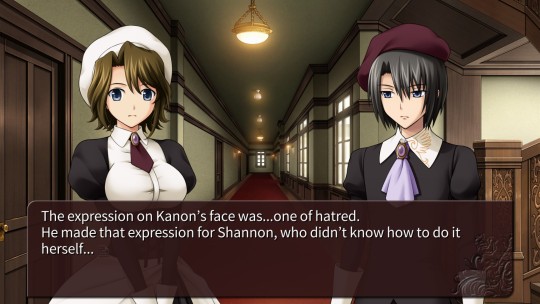
It’s interesting how Kanon is used as a way for Yasu to express the internal emotions that she’s not allowed to paint onto Shannon. There’s quite a few scenes where Shannon isn’t allowed to react and Kanon does it for her.

And so Yasu was so perturbed by Eva and Natsuhi’s words that she added a new voice to her internal dialogue.
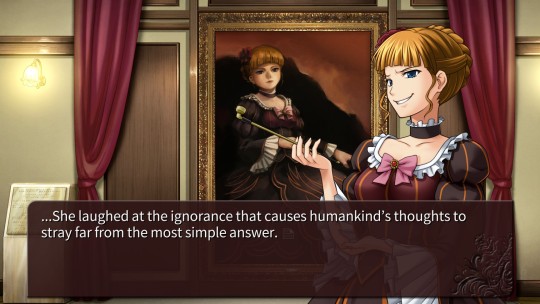
Did you know that the answer is love? I wonder what happens if you extrapolate that idea to the plot as a whole. I’m sure there’s no relation.

So what’s the implication here? Yasu is giving herself a pep talk into using the bombs to destroy the shrine? But if that’s the case, that narrows the window significantly, since Kinzo died pretty much immediately after Yasu solved the Epitaph, right? So either this takes place at a very specific moment in time 2 years ago, they somehow faked Kinzo coming down to get George to leave but somehow Eva didn’t become suspicious, or the timeline isn’t consistent.

Ah, so it’s about conformity - an amusing sister topic to our previous discussion on societal expectations. It’s about Yasu needing to do something drastic, to ensure that something will change; that the life of furniture does not continue forever. Blowing up the shrine, and the eventual Epitaph Murders, are a chance for her to wrestle back control of her life; to have a say in what happens, rather than be a lower life form working around others. Eva and Natsuhi were the tipping point; the moment she starts to think more of herself, they both try and rip it from her, and she’s no longer willing to sit back and let that happen.
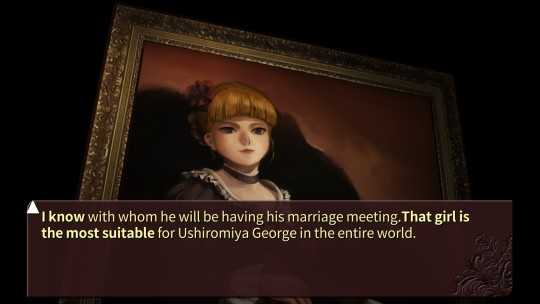
There’s a time limit on this as well, which almost certainly contributes to this being the inciting incident for the birth of Beatrice inside of Yasu. A perfect storm of pressure on all sides.
Kanon’s arrival here is fun to think about - after all, scenes with all 3 of them are still just a raging internal monologue. These should be very interesting to think about going forward.
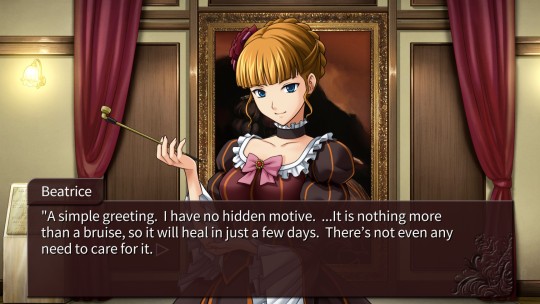
I wonder how much of this is reflective of reality - of course, none of this could have happened, as it was a mutable mark that healed in a few days regardless; but it’s more interesting to think of fantasy adorning reality rather than replacing it. Perhaps Yasu burnt herself with cleaning chemicals - as an act reflective of willpower. To injure oneself and feel the pain; after all, furniture cannot feel pain, so it’s a pledge to herself to be human.

And from that moment on, Shannon was tormented, doomed to suffer the curse we know as being human.
8 notes
·
View notes
Text
Umireread: Turn of the Golden Witch - Prologue
The following contains spoilers for the entirety of Umineko. Please do not read if you are yet to finish it.
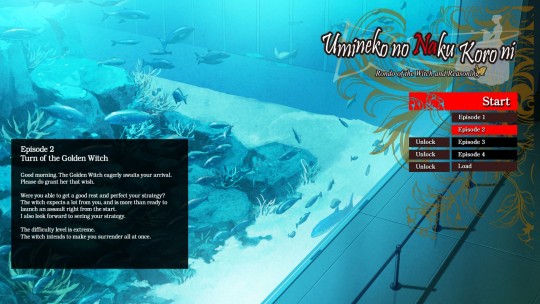
It’s certainly bold of Umineko to go from “standard” difficulty in Episode 1 to “expert” in Episode 2. I’m not sure exactly what warrants such a dramatic change? If we’ve “solved” Episode 1, then we should be able to readily bat away the fantasy scenes it introduces away from Battler’s perspective. I suppose the culprit committing suicide before the end and the rule of Battler’s perspective being untrustworthy 30 minutes before his demise could be quick tricky to theorise around, but I’m not sure if they’re “expert” by themselves. I guess we’ll wait and see.

Both of these outfits are great, I kind of wish we got to see more alternative clothes for the cast. Shannon’s comparison is funny, since this probably would be the first time she’d seen an aquarium.
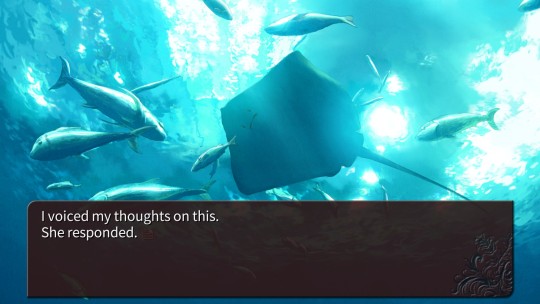
Oh we’re in George POV here… That’s interesting. I’m not entirely certain why this is the case? My initial thought was that omniscient narration might have been saved for only contents on the message bottles/forgeries, to represent the author, and that this was forced by us not being allowed to see Shannon’s POV as per Knox’s first, but I don’t think that’s the case on either fronts - I believe the Episode 1 Prologue was omniscient despite being outside the realm of forgeries, and we do get Shannon’s POV slightly later, so I’m actually not sure what the meaning is here.
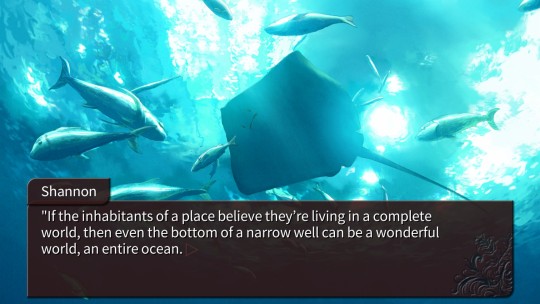
Given how much we’ve already delved into the themes of fantasy and reality, I’m surprised how long it’s taken us to find a comparison to Plato’s Allegory of the Cave. I suppose that one is a bit too obvious of a comparison to make, so I don’t mind it being absent thus far in favour of more original thoughts.

Hooting and hollering. Applause all round.

At this stage I’m still concerned about reading too much into it, but I can’t help but wonder if this line is a slight nod to Yasu’s gender dysphoria. As in, despite identifying as female, part of her is doubting that she has a “real” female body and is getting caught up over it.

As we saw in Episode 1, magic is when other people can engage in fantasy with you; where your mutual fabrication can shut out the truth. With a loved one, the prying eyes of others do not matter; your shared fantasy shuts them out. Love is magic.

I know George does have his fair share of fans and defenders, but it’s the stuff like this which really puts me off him. Even if it’s behind a layer of jest, his controlling tendencies are just way too uncomfortable for me. It’s like there’s a part of him which is indulging in the “master and servant” angle between him and Shannon, which is skeevy by itself, but thoroughly tainted once you consider Yasu’s insecurities and feelings about being seen as furniture. Would she be happy with George? …Maybe? But would she be able to heal? I don’t believe so.
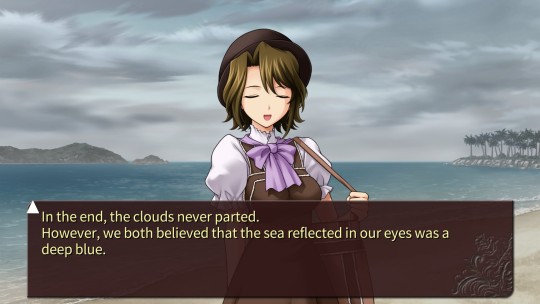
Life can be beautiful when you reject the grey sea of reality and immerse yourself in the deep blue of fantasy.
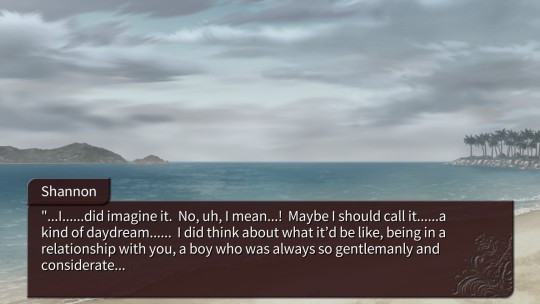
I think it’s interesting to look at this and consider the implications of the relationship being a case of Yasu having immersed herself in a fantasy and then opting to bring it about to reality. Can reality hope to match the bliss found in fantasy? Can it only do so through magic? Does realising her daydream here inspire her to realise her thoughts regarding Battler and Beatrice?

George once again being a bit too weird for my liking. I wasn’t content to let Battler retreat behind the justification he had for fondling his relatives in Episode 1, I’m not content to let George retreat behind the facade of japery here. No matter how you spin it, an element of the true self always resides in the false self.

Yasu takes great effort to not let George feel her fake chest pressed against him, awkwardly diving in a way to give him her head and naught else. Fortunately our gentleman isn’t going to proceed to do a Battler and expose the whole situation.
I’ve said it before, but my main interpretation of the George and Shannon pairing isn’t that Yasu truly loves George, but that she likes the fantasy of the “ideal” relationship that heteronormativity has painted for her. It’s moments like this which make me feel more steadfast in that interpretation - if Yasu was truly happy to be with George, why would she not risk the truth to be revealed? Why was she happy to let Battler uncover her secret in Episode 1, but not the man she is on a date with here? I read that as the voice in the back of her head saying that she’s not really happy with this pairing. She’s just deluding herself into it. Once again, fantasy and reality are in opposition with one another.
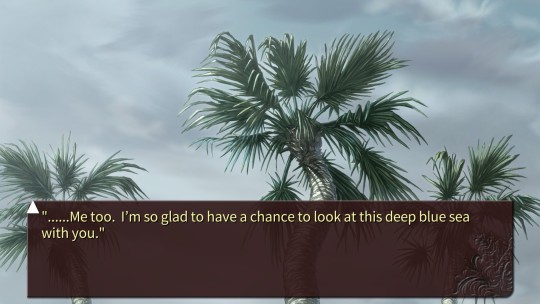
Fantastic writing here where both Shannon and George agree that the sea is deep blue, only for the third party narration to call the sea grey. Hammers the point in perfectly, is honestly a little dry humour-esque, and overall further contributes to the broader concepts of fiction writing being able to strip away the meaningful emotions and complexities of the humans it claims to describe. Episode 2 is starting strong.
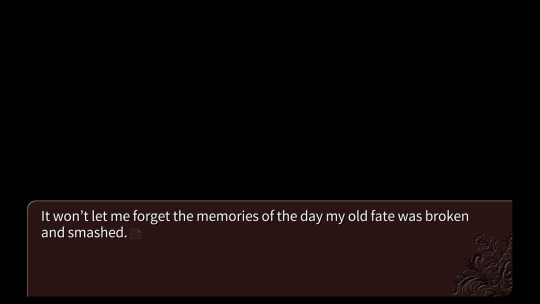
So yeah, we’ve seamlessly transitioned from George’s POV to Shannon’s. I suppose we need to revisit the earlier reference about how this should technically be a direct violation of Knox’s 1st, since we shouldn’t be able to follow the thoughts of the “culprit”. Of course, there’s a few catches here, any of which could be valid - we are pre-mystery, so Knox is not yet in effect; Shannon is not the culprit at this point, or we are specifically separating Yasu from Shannon for this purpose. I’m leaning towards it being the case of Knox’s 1st only being active during the mystery segments, since the main point of the rule is to stop the author from tricking the reader by giving a fake internal monologue. I mean, I suppose that is what’s happening here, but we’ve flipped our own chessboard 360 degrees so it’s best to acknowledge that it happened and just press on.

So there’s two things I’m taking away from the scene - first of all, the use of a mirror is an apt symbolic choice for dealing with Yasu’s self hatred. Is she able to accept herself? Can she be happy with the person she is now? The answer is no - she shatters the mirror, she shatters the reflection, she shatters the visage of the person she sees herself as at that moment. But, alongside this, I believe this moment is meant to be the moment that the explosives are tested. The point of no return - where Yasu is serenaded by the sweet song of vengeance, where the final step before confirming that the massacre can be arranged is completed, that the bombs that ensure her victory are still in working order. This was her last chance to back out from what must be done. But of course, it must be done.
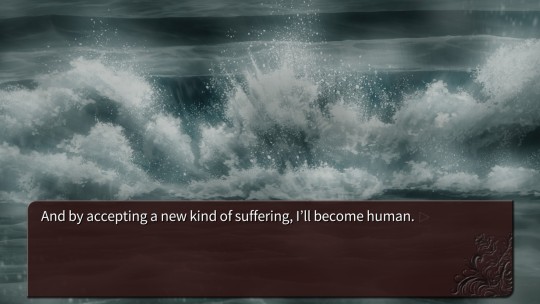
Very complex thoughts here. The physical limitations placed upon her body are what render her as furniture; a being incapable of love. In a sense, being furniture is not to suffer, because a table does not yearn for the earthly pleasures it cannot possess; it knows its place. To suffer is human; but Yasu is to suffer grievously, as furniture attempting to become human. She dehumanises herself for what she lacks; but this very act of self hatred elevates her from furniture. By accepting this suffering, she necessarily becomes human. This is a concept that Umineko has a lot to say about, and I’m looking forward to digging into some of the future confrontational scenes between Yasu and Beatrice.

Yeah, I’m fully interpreting this as being the moment that the explosives are tested on the shrine. The thunder is the deafening cacophony of munitions ringing out.

Welcome back to Rokkenjima, everyone.
9 notes
·
View notes
Text
Umireread - Legend of the Golden Witch: Wake
The following contains spoilers for the entirety of Umineko. Please do not read if you are yet to finish it.
And now for my secret epilogue.
If my heart was not as full as it was, this would be a Post-Mortem. This would be a dissection of Episode 1, a mechanical look at the themes and thoughts developed throughout.
But this is not a heartless check of a cadaver. It is not without respect to the dead. I’m not here to talk scientifically, nor am I here to mourn; we are here to celebrate the life of the story we have just consumed. Henceforth, this is not a Post-Mortem - it is a Wake.
One of the issues with structuring Umireread as a reactionary play-by-play is that it’s difficult to say anything significantly meaningful about the story - while the opportunity has arisen from time to time, we’ll be doing the proper deep dive into the themes here.
Episode 1, while relatively simple on the surface, already establishes quite a lot of the significant themes that Umineko desires to talk about. Of note, we’ve leaned quite heavily into the concepts of truth and fantasy, the dangers of appealing to tradition and the resulting generational trauma, and the ease of dehumanisation towards those you don’t understand. I do not necessarily think that the levels that these are explored in Episode 1 by themselves are of significant note, but rather these explorations lay a phenomenal groundwork for future exploration instead of being complete topics in isolation.
Undoubtedly, the most significant theme explored in Episode 1 is that of truth versus fantasy. This exists in the text not just as a tool towards the mystery - with Battler noting in the Tea Party that he can only trust what he sees, and hence making clear that many of the seemingly unusual elements of the murders are entirely fabricated - but as a way of dealing with truths that offer nothing but suffering. Drawing from a background as a social worker, having been exposed to many terrible incidents and realities of domestic life that the greater public turns a blind eye to, Ryukishi accurately depicts denial as a coping mechanism and paints it with a nuanced brush that does not outright condone it - as evident from the cousins disparaging Maria for pushing her idealised fantasy forcibly onto them - but also ensures that the reader can see the benefits of such a tactic, with many characters being confronted with the truth in a way that is needlessly upsetting. The first twilight makes this evident with Battler being traumatised by witnessing the mangled corpses of his parents, burning the terrible picture into his psyche forever; while George is able to look away from the scene, and avoid having to carry the same weight from witnessing his would-be fiancée in such a state. There is no benefit to their mental health for many characters being privy to the mutilated states of their loved ones, yet the scenes continue to be witnessed by them, bringing naught but avoidable misery.
Being able to turn a blind eye to these truths, while it does not undo them, allows the characters to exist in “fantasy”, letting their mind save them from the horrors they do not need to comprehend. The Tea Party refers to collective fantasy as “magic”, stating that being able to retreat to such a place with others is something special, painting it as a positive thing. While I will not be getting too deep into the specifics, as I am not a theologian, we can see this phenomena in real life in cases such as Religion. Regardless of the truth of what happens to us after we die, humans are aware of the concept of oblivion, and for as long as they have had intelligent minds they have sought to reject it. Religions and other explanations that seek to deny the possibility of oblivion - even if they are not grounded in any known scientific principles or evidence - are an example of this sort of mentality. Religion, and these beliefs as a whole, act as a boon that makes the lives of the people within them better. Similarly, the world is host to significant horrors in all shapes and forms - war and famine are such broad terms that they almost feel sanitised, but the reality of them is devastating, and the fact that so many humans across the world are living in such unimaginable conditions can take a significant mental toll on the human mind. To those living in first world countries, who do not need to worry about where their next meal is coming from, whether today will be their last as explosives rain from the sky, whether continuing to live is even worth the suffering laid before them - being cognizant of these truths is not necessarily a positive thing. It is easy to forget in the information era, with easy access to the affairs of the world at a moment’s notice, but humans have spent the vast majority of their existence completely unaware of the events of far-off places. Even just a hundred years ago, if someone were to ignore the reports of a newspaper, they would be able to live their life centred on the actions and events that were immediately relevant to them. Such a life is not a moral failing; many of those who trek through social media sites, learning of terrible events in far off places, will never make a difference towards them. Their knowledge of these affairs offers no tangible benefit for them; only a further sense of dread towards the state of the world. Even those who deny this notion and insist on being educated on these matters, under some sense that this information makes them a better person, fall prey to the fantasies that have been constructed around them. While the news may lift the veil on atrocities in the middle east, there is a notable lack of reporting to many African countries and the events that are ongoing there. Would being acutely aware of the atrocities taking place over there actually benefit you in any way? Or, for the sake of your mental health, is it better to not concern yourself with negative affairs that may never impact your life in any way? Umineko takes the approach that can be constructed through game theory, stating that if truth makes your life measurably worse, and fantasy makes it measurably better, then you should opt for fantasy; on the understanding that your fantasy may not make the lives of others measurably better, and should be shared with caution and care.
On a lighter note - generational trauma. Umineko also establishes quite early on that the Ushiromiya Family are old money - while Kinzo managed to rebuild the family in the post-war era, meaning there is some separation of tradition and the Neo-Ushiromiya, the family has returned to conservatism and places great value on old fashioned ways. The family is significantly patriarchal, with the dining room arrangements establishing that grandchildren of the family matter more than the married partners of their parents. Women are thoroughly treated as being second-class, if not worse, with the term “borrowed womb” showing up on several occasions - stating that they are nothing to the Ushiromiya but a machine to pump out more children for them. This mentality takes root in Jessica, who as early as Chapter 1, feels defeated over the fact that her sex makes her inferior to men. Kinzo’s lecherous ways are also displayed as a trait that has progressed through the family, with Rudolf being a notorious womaniser and Battler having several moments where he is acting perverted towards all manner of girls in the family. Regarding the aforementioned mentality, Umineko makes sure to portray this in a negative light, by investigating how this stigma affects those who must abide by it. Kinzo is noted as having raised his children quite forcibly, being no stranger to beating them for insolence or perceived misbehaving. This iron-fisted approach to parenting has carried through to the next generation, with most of the cousins admitting to having received beatings, or physically receiving them through the course of the story. This most notably flares up in the portrayal of Rosa and Maria, with Rosa having trouble maintaining control over her life as a single mother to a neurodivergent child, exacerbating the problem by lashing out uncontrollably as she has learned from her father. Rosa’s reaction to being awoken by Genji in Chapter 7 is reminiscent of deep-seated trauma, believing her being stirred is an inherently negative sensation that will be accompanied by heavy reprimanding; potentially of a physical nature. This manifests in her tendency to violently beat Maria, ensuring that the cycle of abuse continues for generations to come, should the Ushiromiya family not be put to a stop before that.
Finally, Umineko makes explicit in the Witches’ Tea Party about the divide between treating characters with love and respect, identifying the human behind them, and seeing them as nothing more than parts of a story. This is reflected even within the story by the nature of dehumanisation, with characters such as Eva removing the humanity from Shannon and seeing her as naught but “some servant girl”. In the same way that someone reading a story with no intent to engage past a surface level understanding would reduce a character to mere tropes - for example, boxing Eva off as a “girl boss” and only engaging with her through the lens of that trope rather than as the complicated character she is - characters who are vibrant with their humanity have it taken away by those who do not care to understand them. As we will come to see, one of the beating hearts of Umineko is that of Yasu wanting someone to understand her; to see her not as a cold-hearted serial killer, nor as an illegitimate child seeking revenge, nor as a trans girl boss who can do no wrong. Anyone reducing her to an aspect of her personality and failing to engage with her beyond that lens has failed to fulfil her wish. She wants to be truly known, appreciated in her entirety by the uncountable aspects that are present in every human being. After all, if you reduce a character to a surface level trope - to but a single purpose in life - then they would be no different to a piece of Furniture.
Umineko will continue to build upon these themes and explore them in the Episodes to come - however, even isolated from that, Episode 1 has done a remarkable job of establishing and exploring these concepts in a way that most readers would fail to comprehend on an initial reading, let alone an immediate follow up should they decide to do so again without progressing further. In the same way that a character in a story must be appreciated in their entirety to be seen as human, so too must Umineko be consumed in full to truly appreciate the work that it sets out to do. After all, you must open your own heart to be able to realise the one that lies before you. Without love, the truth cannot be seen.
Beyond these themes, Umineko Episode 1 is a good piece of literature - by itself, it offers what feels like a relatively realistic depiction of a rich family thrust into a murder mystery situation, where the characters flail and doubt themselves while the clock runs down on what could have been an avoidable tragedy. There is a pervasive sense of dread as more characters are killed off and the survivors struggle with the reality that they do not even know what is killing them. It indulges in horror tropes that we do not really get to see in future episodes, as fantasy is accentuated and tools are provided to help cope with the mystery and avoid drowning in the uncertainties that plague would-be solvers of Episode 1; when a culprit could be identified relatively readily, but cannot be confirmed due to the probatio diabolica inherent to the possibility of a 19th person, or other outcomes such as hidden passages or inexplicable scientific tools that could bypass restrictions placed on apparent closed rooms.
Episode 1 is at its best when it’s really digging into the humanity of the characters - I have listed the first twilight as a specific highlight already, with the visceral reactions feeling incredibly real - perhaps to an extent that I would not be surprised if Ryukishi was drawing upon a specific incident he witnessed during his time as a social worker. However, Umineko is at its worst when the opposite occurs, when humanity is cast aside for the purposes of narrative or exploration. There are several instances when characters will have just gone through unimaginable grief, and within hours are casually chatting about concepts like children who just read something cool on wikipedia. And of course, the story is served a great disservice by opening so heavily with Battler attempting to grope his family members.
Umineko Episode 1 also appears to dwell quite readily in subversion. In many ways, it looks to make the reader lower their guard, before hitting them in a way to ensure that they know they are reading something different to what they are used to. The game opens with a jovial mood and several tracks reminiscent of more generic visual novels, before introducing more complicated musical arrangements and the horror themes further on. The Tea Party in particular directly tricks anyone expecting Umineko to be a rehash of Higurashi, making it clear mere moments later that this will be a very different tale to the time loop mystery that many had read before. Battler’s antics may also be viewed through this lens, with early Battler appearing more like a generic protagonist in a work targeted towards otaku, erring on the side of lechery and having it swept aside as a joke. Whether this was a wise approach, given that early Umineko (and much of the merchandising) is designed to appeal towards otaku while the work itself is a scathing criticism of them, is yet to be seen.
And, if I may finish by indulging myself once more, I just want to quickly reflect on the current state of the reread. I have no doubts that we will be finishing this - while I can’t guarantee that I can handle near-daily updates for the next 20 weeks, this shan’t be a project that will be abandoned halfway. We will progress to the very last lines of Episode 8, by hell or high water.
We are around 32,000 words into this extended analysis. I wasn’t quite sure what form I wanted this to take when we started, beyond a vague idea of the format, but I feel like we’ve already got past the initial hurdles, dealt with some growing pains, and settled into a good approach regarding what should be addressed and omitted for each chapter. Which parts should be acknowledged out of interest, what jokes should be made for levity in our own work, and what demands a more thorough investigation under a microscope. While Episode 1 is actually one of the longer episodes, funnily enough, I still foresee us easily writing more than 200,000 words by the time the pen is placed down after Episode 8. I anticipate Umireread to be longer than even the longest Episode of Umineko.
That being said, thank you to everyone who has engaged with this so far - while this is still a project I would want to undertake even if it was all being projected into the void, the humble amounts of interaction have been good to see. I appreciate that we seem to have a couple of readers coming back for each post, and a few people who have left their own comments and thoughts - which have all been interesting to read. As I said at the very start of this work, to all the people who have joined us already, to all the people joining us now, and to anyone who may join us, no matter how far in the future, thank you for taking part in this journey. I hope that, just as the love evident in every part of Umineko radiates from the page, the love within my own words can be seen by all that they reach.
With that, Episode 1 comes to a close.
Seven more to go.
7 notes
·
View notes
Text
Umireread - Legend of the Golden Witch: Epilogue: ????
The following contains spoilers for the entirety of Umineko. Please do not read if you are yet to finish it.

SHE’S HEREEEEEEEEEEEEEEEEEEEEEEEEEEEE
Considering I had very few thoughts on Bernkastel during my first playthrough, I’m ecstatic to really delve deeper into her this time round. I cannot wait for Erika to show up in the Answer Arcs. There will be so much gushing over the gremlins then, mark my words.
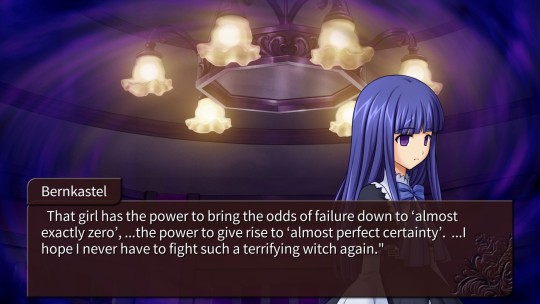
I have terrible news about the Answer Arcs for you, Bern.

Bernkastel comes in quite strongly with Umineko’s relationship to fiction, which isn’t necessarily a new concept by this point, but shes does so from a more heartless angle. There is interest in the humans, but not the humanity - the characters in the tale are mere playthings, inhabitants of a doll house to be bent and broken until the one playing with them decides to abandon them. From that sense, Bern is clearly the antagonist of the story at this point, but it’s not framed that way in the text for those who have not dug deeper. Beatrice is about understanding the human, Bernkastel is about using them. Diametrically opposed from the get go - but without love, this cannot be seen.
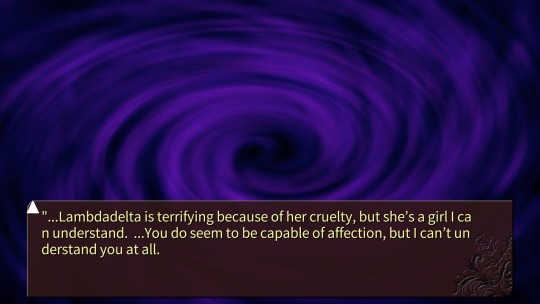
Simultaneously building the point that Beatrice’s motive is inscrutable, an opponent who wants to be defeated, while reinforcing the point we just made about caring for the humans behind the characters versus simply being interested in them. If characters in a story are just vessels for your entertainment, puppets made to dance for your whims, of course you’re not going to be able to understand someone who is treating that puppet like a living, breathing person. I’d say it’s a one-to-one comparison of a child doing exactly that at a real life puppet show; while good adults wouldn’t necessarily discourage it, and hurt the feelings of the child, everyone would inherently think the care of the child is misplaced into the inanimate puppets they’re attending to. But of course, in this case, it’s the child who is right, and the adults who are wrong.

Very amusing to see Bern emerge from a 100 year time loop and immediately go “I survived that endurance test but if this story sucks then that’ll be the death of me”.
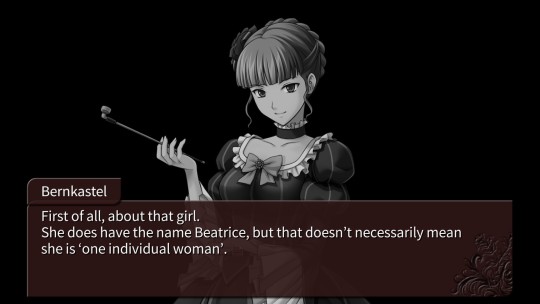
Beatrice sure isn’t “one individual woman”, indeed! There are only 16 people, after all.
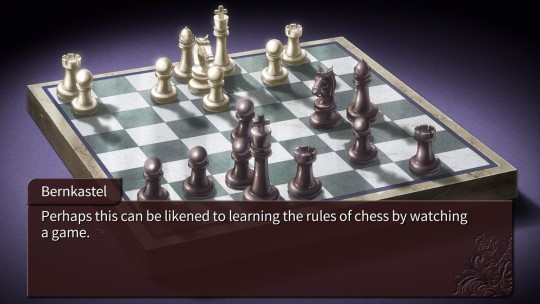
I wanted to make this observation back in Chapter 15, but opted to save it for here, as it felt more appropriate to end Episode 1 on it rather than let it get buried a little further back.
Umineko drenches itself in chess metaphors - from the aesthetic to the technical, through and through, Umineko wants you to associate it with chess. Battler and Beatrice are playing chess on the gameboards. Umineko is about playing chess.
But of course, Umineko is littered with misdirection. You’ve seen all the ways it’s lied to you so far, right? You don’t honestly believe Umineko is about playing chess right?
Good - because Umineko isn’t about playing chess. It’s about playing Mao.
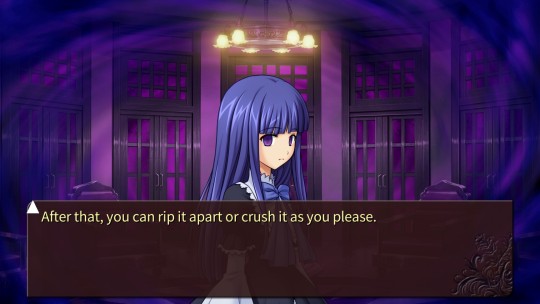
Bern’s interesting philosophy towards literature surfaces once more. Once you’ve grasped the meaning behind it - the intention; the golden truth - you are free to do whatever you want with it. But there is no care or love in Bern’s interpretation. Once it’s your story, you rip out its guts for your amusement. What else would you do with it, after all?
I think there’s something to be said about how cruel and merciless this is. We’ve already established several camps when it comes to the consumption of literature - the dilettantes, who care not for deeper meanings or even the real intentions behind a work, and are happy to repurpose it for their own devices. As a contemporary example, you can see this as the type of people who will write schlocky fanfiction about characters, careless to the canon and happy to put words into their mouths that they would never say, for baseless interpretations that they favour. You have Beatrice’s approach, to understand the humans behind the characters, to be able to reach golden truths behind the media itself. I suppose to continue the fanfiction metaphor (which is apt, considering the nature of forgeries), these would be written stories that feel lifted straight out of the source material. That perfectly complements it and would fit in as an actual part of the world it came from.
Bern’s camp is the most perverse - to reach the understanding required of the Beatrice camp, and then gleefully reject it for your amusement. This one doesn’t fit as nicely into the metaphor we’re developing, but if you’re willing to humour me for a moment, I’d say we can represent it as fanfiction that goes against the wishes of the canon. That, while far from amateur, deviates from the story; making main characters go down different paths, engage in different love interests, killing off characters like a curious god testing their powers.
Of course, this immediately feels like a disconnect - after all, how is that a bad thing? Isn’t it good that fans are engaging with the work and exploring alternate possibilities? Well, I’m absolutely not arguing that someone writing an unconventional ship for a series they like is somehow doing it out of malice. But the point here is that, when a story is written, the author has a specific intent. If they pour their heart and soul into these characters, they know what they want to happen with them; if the pen conjures up the human inside of the vessel, then the author is writing what has to happen with them. If you are able to see those very elements, and choose to defy them, you’re ripping apart the manuscript. You’re crushing it as you please. In an extreme case, such a thing could be quite upsetting for an author to see - to have their beloved characters defiled in such a way.
But, most importantly, we’re not talking about fanfiction of a popular anime or the like. In Umineko’s case, we’re talking about what was a real life event - with real life human beings. Reconsider this example not with a fanwork of shonen or a cartoon, but of fiction written about a tragedy. If modern examples are too evocative, you could consider how this applies to something like the Titanic. What is the morality of using that disaster as set dressing, without having thoroughly researched it yourself? What of the James Cameron film, and the love story contained within? What of the many other terrible Titanic films?
It’s kind of hard to come up with specific examples for Bern’s camp. For example, you could look at how YIIK used a real life tragedy irresponsibly as part of its plot, but you could just as easily argue that was a case of them being dilettantes rather than people who had actively cared for the incident they were using.
I don’t think I’ve conveyed all that in the optimal way, but I hope the point tracks. I suppose it boils down to “Beatrice’s philosophy on literature is good, the Dilettante philosophy is bad, Bern’s philosophy is the worst”.
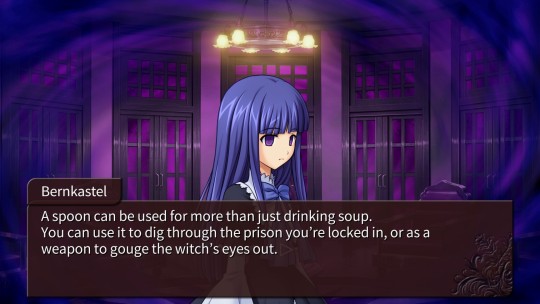
Once again, it’s up to you how much you want to respect a story once you’ve uncovered the heart of it. Treat it with love, or scrap it for parts. Either option is valid in the greater scheme of the uncaring universe.

Bern really wants us to break Beato, huh?
Well, I suppose she’s not actually talking to us here. Unless I’m mistaken, this is Bern talking to Ange, right?
I suppose we should address the elephant in the room, and how the Witches’ Tea Party fits into the greater canon of Umineko. While we’ve stated that the meta scenes in Purgatory are a reflection of the mental struggle that Tohya is facing, there isn’t really an equivalent parallel to be made here.
I think it’s something of a fool's errand to try and explain this all away with reality. After all, we seem to be safe to say that Witches do “exist” in the greater When They Cry canon; Higurashi was inevitably coated in supernatural elements by the nature of the time loop, and Bernkastel referring to those events here does confirm that Umineko shares the same universe (unless it’s a significant misdirect on Ryukishi’s part, which is a non-zero possibility, but I’ll be discounting that for our purposes). Featherine existing in Higurashi Gou further ties the universe together, so I think we’re relatively safe to say that the Witches’ realm exists as a narrative tool to connect the Sea of Fragments that contains the gameboards of Higurashi, Umineko, and Ciconia.
That doesn’t necessarily mean that this is free of meaning, however. If Bernkastel is talking to Ange here, then we can’t discount the possibility of these scenes being representative of the mental struggles that Ange is facing. The gameboard layer of message bottles and forgeries, the meta layer of Tohya coming to terms with what transpired, and an additional layer of Ange attempting to do the same in her situation. Of course, we’re not going to properly be able to explore that until we’ve actually met Ange - but we’ll get to that in due time.

And that’s a wrap on Episode 1! For all the criticisms levied throughout, I do think Episode 1 is a good time - of course, it’s hindered by the fact that it’s effectively just a giant introduction to Umineko, and there is no piece of (quality) media where the pilot can exceed the highs that the show will go on to achieve. However, we’ve had a good establishment of themes, exemplary work on what to expect going forward, and is obviously very meticulously crafted in a way that I hope even new readers can see (even if they can’t quite comprehend exactly what is going on behind the scenes). Umineko is actually three stories layered on top of each other at all times - the mystery layer, of “truth” and “reality”, the fantasy layer, where the witches dance and false closed rooms are concocted; and the meta layer, of stories penned by broken people trying to understand themselves through what they have written. In this sense, Episode 1 has been nothing short of an artisanal lasagne - and the recipe is only improving as we go.
4 notes
·
View notes
Text
Umireread - Legend of the Golden Witch: Epilogue - Tea Party
The following contains spoilers for the entirety of Umineko. Please do not read if you are yet to finish it.
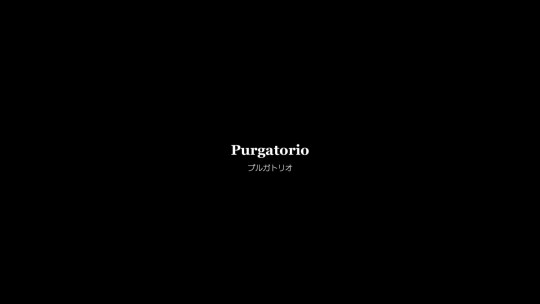
Oh hey, is that the Purgatory, from Dante Alighieri’s hit epic, Divine Comedy? Guess everyone did die at the end, then. Couldn’t possibly be any other interpretation, right?
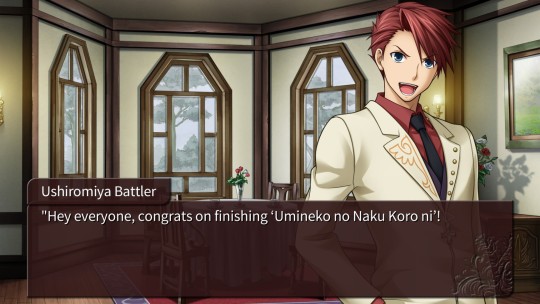
Thank you Battler! Very cool!

I know it’s about to become a lot more obvious in a second, but it’s good to see the game reminding you that the Epitaph is there to be solved, and wasn’t just a forecast of murders. Our job is far from done.

It sure was a cool scene, and it sure was a showdown with the culprit - but not in the sense that we might think.
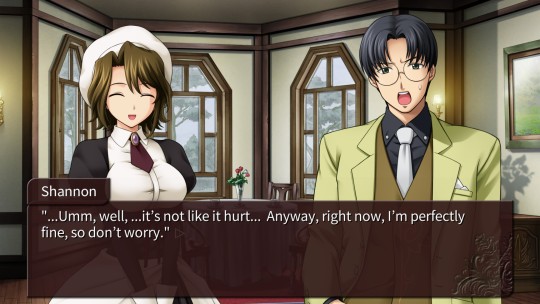
Very funny Ryukishi - I’m actually kind of surprised how generous Episode 1 is with the suspicious nature of Shannon and Kanon’s deaths, given you should be able to figure out how suspect they are just by reasoning through the scenes without any extra prodding. Although, I suppose the reward is that these lines are quite funny once you know the intent behind them.

Legend of the Golden Witch is littered with subversions and baits and switches, but this one here takes the crown - this violently comes for the throat of anyone joining us off the back of Higurashi, or anyone familiar with the concept of Wrap Up Parties as a whole.

So, obviously, it’s funny to talk about how Battler knocks it out of the part with Kanon’s fake death (before being ridiculed for it), but this is a great juxtaposition between early Battler and the Answer Arcs. A lot of the suggestions for solutions here aren’t just terrible, they would actively ruin the story if they were used. I wonder how different things would be if we armed Episode 1 Battler with the Knox Decalogue and the knowledge that it’s in effect.
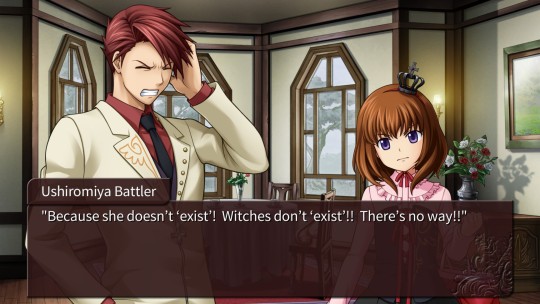
North Wind and the Sun in full effect - tell Battler to accept witches and he refuses with every fibre of his being. Let’s see how long it takes for the Sun to shine.
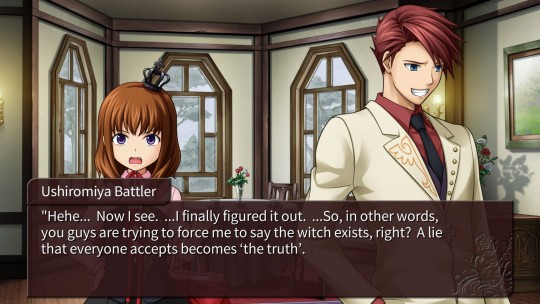
Yup, that’s how the alibis and fantasy scenes have worked so far!
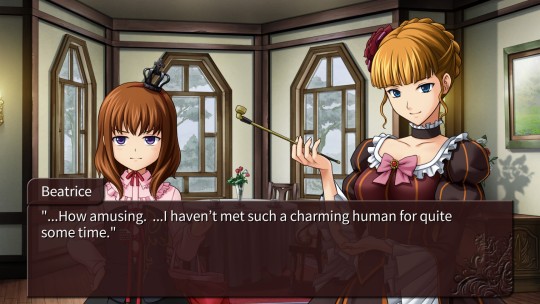
It’s kind of crazy that one of the de facto main characters is only showing up after a novel and a half’s worth of words. We’re what, just shy of 140k words in at this point? That’s insane to think about.
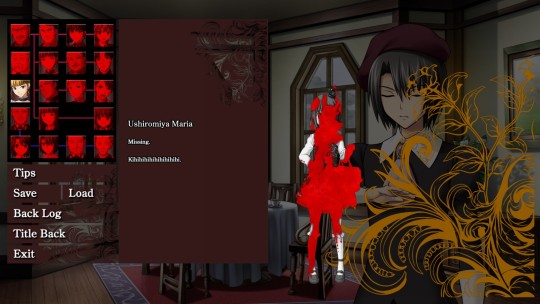
I opened up the menu to check Beatrice’s character info, took a gander at the post-death info for the kids, and yeah I think Maria is just unironically the author of these now. Kihihihi.
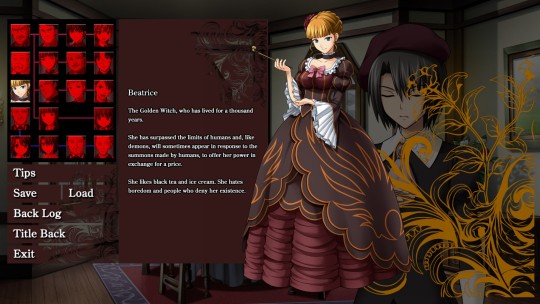
You know, I just said Maria was writing the tips, but the last part of Beatrice’s information here feels like the kind of thing you’d see on one of those terrible fanmade wikis. In a way, this feels like Yasu writing about her very cool OC. I suppose, given that, we could read into the rest of it as Yasu writing as Maria - after all, that was what the initial message bottle was in the first place, right?

Even the narrative is cracking jokes now - very funny stuff, this got me good.
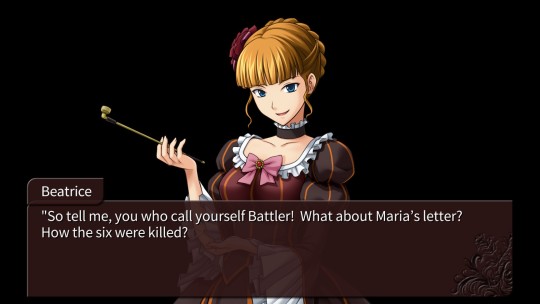
Oh? “You who call yourself Battler”? We’re going straight in with that one, huh?
So, as foreshadowing for the “you are not Asumu’s son” arc in Episode 4, this also lays an important point out for us - we are outside the territory of Yasu’s message bottles. There is no way she would reasonably know this at this point. Of course, that’s obvious, since the message bottles are just the contents of the “main” stories of Episodes 1 and 2, as Yasu would never write out this meta battle between Battler and Beatrice. …Well, okay, we can’t say that for certain - I suppose, if I was having to say something in red, it would be that she wouldn’t write this for a message bottle.
I haven’t looked deeply into recent Umineko theories, so I’m unsure if there’s a common consensus of how Purgatory and the meta sections fit into the “truth” of the story, but I personally see it as Tohya’s inner struggles to understand and make peace with the events of Rokkenjima, and the Battler persona that was left behind. (I’m doubling down on my prediction that Ciconia’s addressal of multiple personalities will recontextualise Umineko - Kinzo had issues with it, we’ve seen it with Maria, Shkanon leans more towards gender identity (but that’s also present with Miyao), and we have the Battler/Tohya split. SOMETHING is cooking behind the scenes.) This initial confrontation with Beatrice is representative of Tohya first coming to grips with the past, and who he once was.
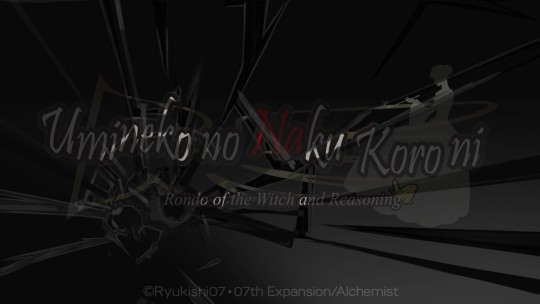
Prison strip is one of those songs that I didn’t like that much the first time round, but has grown on me significantly. Such a cool backing track for the gauntlet being thrown.
And with that, we’re done with the Epilogue… Or the first one, at least! Time for second Epilogue!
4 notes
·
View notes
Text
Umireread - Legend of the Golden Witch - Chapter 17: Notebook Fragment in a Wine Bottle
The following contains spoilers for the entirety of Umineko. Please do not read if you are yet to finish it.
This is an interesting one, because while this is de facto the shortest chapter in the series - quite literally just an ending cutscene - this is remarkably dense with important information. Unlike Chapter 9, which was short for seemingly no reason, the emphasis placed here is well earned.
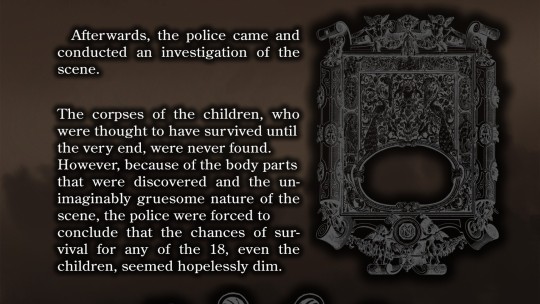
So already we’re off to an interesting start - if we’re fighting for mystery, the bodies never being found is quite a significant hurdle to overcome. Of course, it’s an isolated island, so you could invoke the usual rules and say that they were dumped in the sea or thrown in the forest somewhere, in a way that evaded the police investigation or future discovery. But then you need to construct an argument that someone survived past midnight, and managed to escape police investigation - which would be a relatively tall order, given we have established that the police would be able to search for fingerprints and find traces of the culprit afterwards. How do we explain all of that?
Of course, Notebook Fragment in a Wine Bottle lives and dies on the fact that it doesn’t tell you that half the island was blown up. It dances around this fact - perhaps a little too safely, as I wouldn’t have minded some sort of reference that still encourages the interpretation of magic, such as saying that it seemed like the island had been rained down on by lightning or some other powerful force. The use of 18 is also fun here - with the truth sealed away, the fantasy of the two additional humans has become imbued with magic.
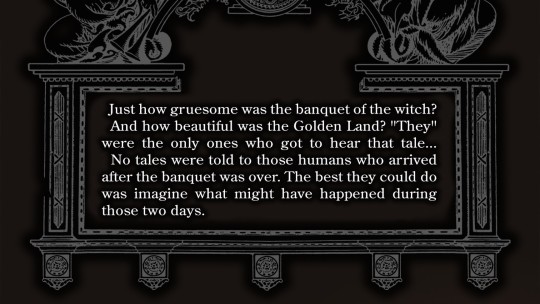
Exceedingly clever work here - of course, Episode 1 is a fabricated tale in a message bottle. Those present are the only ones who have heard that tale - because even we haven’t, at this stage.
And of course, people did imagine what may have happened during those two days. After all, we have Episode 3 through 8 to show for it.
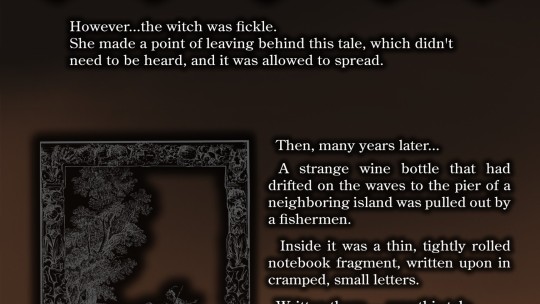
PHENOMENAL work here by swapping from “that” tale, Rokkenjima Prime, to “this” tale, Episode 1. It’s so natural that you’d be a savant if you caught it and realised it was referring to two separate tales.
Referring to Episode 1 as “a tale which didn’t need to be heard” also carries several meanings - on the one hand, it alludes to how the catbox could have been kept shut; how, if it were not for the message bottles, the incident likely wouldn’t have spiralled into the irresponsible sea of forgeries that it inevitably did. And, on the other hand, no-one needed to hear Yasu’s penmanship; a personal piece of vent art that spilled out many emotions that she had bottled inside, now bottled in a more physical sense. But even though this tale didn’t need to be heard, Yasu wanted it to be. Perhaps it was selfish of her - perhaps this selfishness was justified. But consequences be damned, she just wanted someone, anyone, to know of her. No matter the cost.
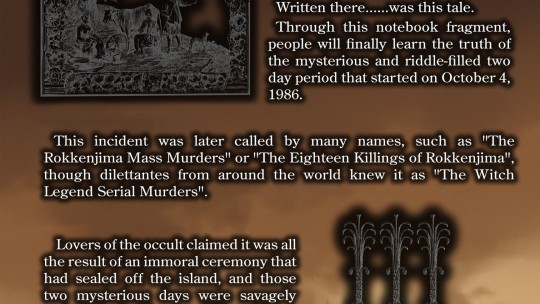
I honestly cannot believe how excellent the writing is in this section. “Through this notebook fragment” makes the implication that Episode 1 is the truth, that we have seen Rokkenjima Prime - but that’s not what it’s saying at all! It is through the existence of Episode 1 that people will learn the truth, as it sets in motion the wheels for people to pick apart and understand the rules at play, to come to understand the culprit and to come and understand Yasu. Of course, there’s something to say about how Rokkenjima Prime is never truly uncovered, and that the world does not necessarily know the full details of it - but of course, the truth is so much more than simply saying who killed who, right?
Dilettante is a phenomenal choice of word - it’s so entirely accurate to what the story wants to capture. Umineko is not critical of those who delve into worlds and treat them with care and respect, who take the time to understand what they are dealing with. It is critical of those who play with the legacies of others without ever progressing past a surface level interest in the subject.
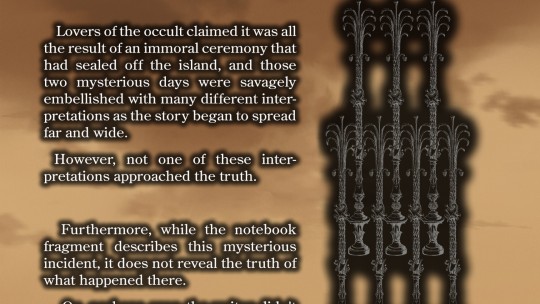
This chapter! Is! So! Good! Okay, so we’ve now established how occultics latched on to this incident, and - with a surface level understanding, by the use of the word dilettantes a moment ago - proceeded to write their own forgeries while adding their own spins on the massacre, using this real life tragedy to write tropey fanfiction for their own amusement. And these are the people who cannot understand Umineko - who, by not engaging with it any further, lock themselves out of a true understanding and appreciation for what is contained within. You cannot find the truth from the comforts of your armchair, from a position where you neglect any mental challenge in favour of stagnation. It must be actively fought for. It must be earned.
We also confirm the earlier comment about how “this” tale and “that” tale are separate - Episode 1 does not reveal the truth of Rokkenjima Prime. Of course, you can interpret this as the fact that you’re not told who the culprit is, but we both know that’s definitely not what it’s referring to, right?
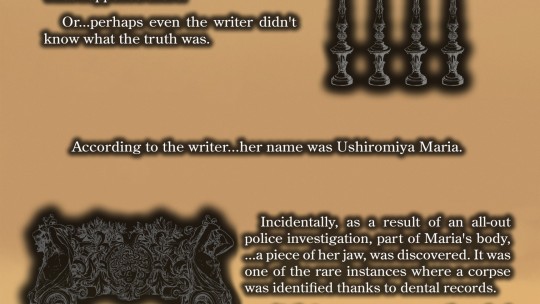
And we acknowledge that, when this message bottle was written, Yasu had no knowledge of how Rokkenjima Prime would play out - Episode 1 predates it, after all!
So, there’s a big point here, made about attribution. After all, Yasu can’t just name herself as the author in these tales - they’re made for people to learn about her, after all.
Hold up - is this just the North Wind and the Sun once again? After all, Yasu can very easily let people know about her - she just names herself as the author, or better yet, writes message bottles saying “Hi, I’m Yasu, here are some facts I would like you to know about me.” But that’s the North Wind - she’s blowing the facts at people, and if she does that, no-one will learn the true her. People would take a passing interest, but they’d be disinclined to dig much deeper. By using the Sun - to persuade people to find the truth by digging deeper into the tales - while many people may not go that far, she hopes (if not ensures) that someone, anyone, will take the time to understand her. And who she really is.
Anyway, we got sidetracked - the point I was intending to make there was that Maria is a curious choice of attribution. We know she couldn’t pick herself, so why her? I don’t really have a good answer for that, and I’m not entirely sure if this is properly addressed anywhere in the text. My best guess at this moment in time would be that, again, Yasu had a soft spot for Maria - attribution is a kindness that she’s bestowing upon her, that her name will carry on with additional meaning. More cynically, I suppose it could be a case of picking the youngest child, to make people go “hang on, a nine year old shouldn’t be able to write like this”, and encourage people to bypass the surface level and begin investigating who Yasu is. But of these two, I’m leaning towards the former.
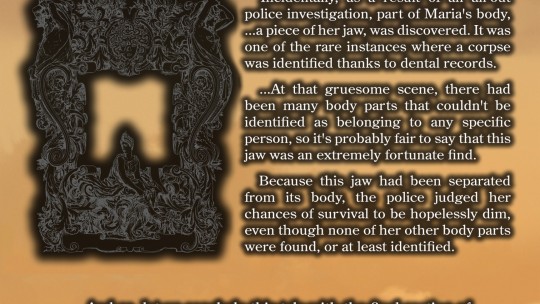
This is another one that should be tripping up people digging into the mystery - beyond Maria’s jaw being detached from her body, and nothing else being discovered, we say “there had been many body parts that couldn’t be identified as belonging to any specific person”. That does not match up with what we know about the rest of the murders in Episode 1. Something else has gone on right at the end, here.
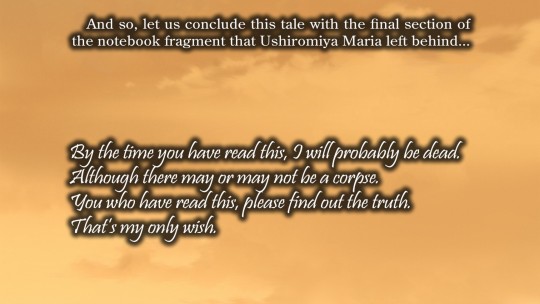
Very good choice of words accounting for all outcomes on the roulette - she’ll probably be dead, but maybe Yasu is defeated, or Maria manages to escape the explosion. Similarly, depending on how the final hours shake out, there may or may not be a corpse; she may be mostly unharmed by the edges of the explosion, or her body is eviscerated by it. And of course, Yasu wants people to know the truth, she wants people to know her. That is her only wish. That is Umineko.

After all, even if they desired the 10 tons of gold, they did not solve the Epitaph. It remains out of their grasp.
The winner is the Golden Witch Beatrice. The roulette ball falls into a pocket of rouge or noir. It is the expected outcome, but we have so much to go - we may hope once again that we finally hit the zero. We receive the gold. And deal with the consequences associated with it.

And so the introduction to Umineko comes to a close. A novel and a half worth of content has been consumed - and now the tale can truly begin.
Well, that’s not entirely accurate; we have the Tea Parties to get through, first. But hey - it’s not like anything important ever happens in a Visual Novel Wrap Up Party, right?
4 notes
·
View notes
Text
Umireread: Legend of the Golden Witch - Chapter 16: The Golden Witch
Sun, Oct 5 1986 - 11:30PM
The following contains spoilers for the entirety of Umineko. Please do not read if you are yet to finish it.
Given Chapter 17 is more of an Epilogue than an actual chapter, there’s something to be said about how, for “Legend of the Golden Witch”, the halfway point is “Legend of the Gold” and the final chapter is “The Golden Witch”. There’s no real meaning to this, I just think it’s a neat little thing in the choice of naming.

Full disclosure - I remember coming out of my first readthrough enjoying the prospects of Jessikanon a lot. I’ll be keeping an open mind and find myself willing to change my perspective if the story swings me that way, but I vastly preferred the idea of Kanon with Jessica than Shannon with George.
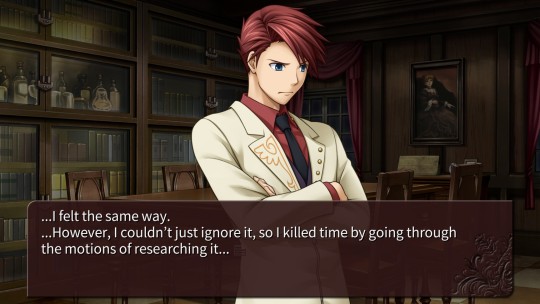
Yet again, everyone knows that knowing the meaning behind the magic circle will do no good, and simply upset them, but Battler decides to pursue the truth regardless. A harmful truth is better than a blissful ignorance.

Once again - we find ourselves in a parallel of the scene with the receipt. Everyone took Eva’s word for it when she literally could have been lying about it. Once again, no-one other than Natsuhi can confirm the letter wasn’t there before she placed the canned food, nor can she defend against the accusation that she was the one who placed it.

Hey, so about all those phone lines being out?
This definitely isn’t a plot hole, as it’s addressed by the characters in universe, so it’s pretty safe to say that they were indeed tampered by the servants and fixed at some point (if not by Yasu making the most of the time while everyone was in the study, then by one of the servants on the way back to the parlour.) Either that or, you know, magic.
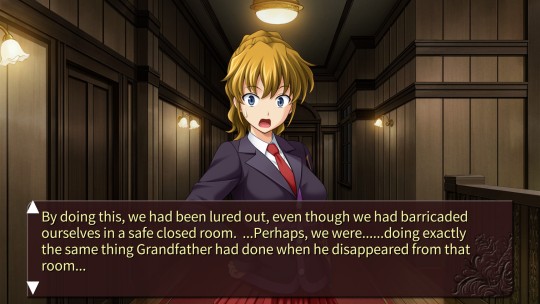
Oh, this is an interesting misdirect. I like this one a lot - providing a solution to a problem that didn’t even really exist in the first place. That’s surely how Kinzo was drawn out of the study, and not, you know, him not being alive in the first place.

Yasu has no knowledge of this, right? She wasn’t there to see Battler give Maria the charm back (it would be contrived if she somehow had eyes on that moment without anyone seeing her), and I’m not entirely convinced that Maria would be bringing up the anti-magic charm to Beatrice of her own volition. With that in mind, I think it’s worth chalking this up to Yasu having a soft spot for Maria, not wanting her to die horribly - something which would match up with the second message bottle also seeing the little girl survive to the end. I think that does make the wilted rose a weak point earlier, since it seems out of character for someone who clearly cares for Maria’s wellbeing to actively torment her, but I suppose it’s not impossible to rule it as something Yasu did for the greater cause at hand, especially considering everyone would be dead within 48 hours anyway.
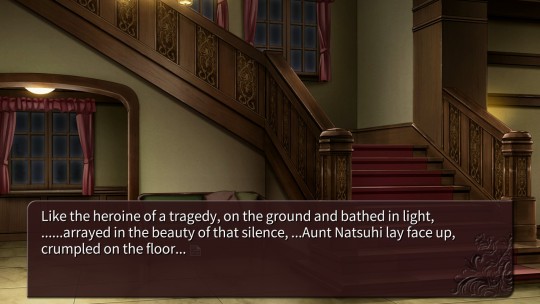
LIKE THE HEROINE OF A TRAGEDY.
Natsuhi’s final duel here is a thing of beauty - she’s the heroine of a tragedy, but that was the entirety of the episode behind her. Plagued with headaches, having her loved ones torn away from her, accused of atrocities far beyond her control and thrust into a leadership position that she did not want - Yasu’s writing has ensured that Natsuhi suffers at every single turn of the past two days. But not here. She’s allowed to go out honourably.
I see this as a humanised element of Yasu - a realisation towards the end of her work that, while she’s used Natsuhi as an instrument of catharsis, tormented the one who has ruined her life, perhaps she has been a little too harsh in what she has put her through. How she herself has ignored the human behind the monster; and reduced Natsuhi to naught but someone deserving of torture. In this moment of lucidity, Yasu relents, and allows Natsuhi to have a fitting ending - one where she still dies, one where she does not make it to the golden land - but not one of embarrassment. Yasu is not a cold hearted killer. There is that part of her that allows her to see the best in even the worst of people; no doubt the same part that allows her to let Rosa go out so elegantly in Episode 2 despite her horrific treatment of Maria. Yasu is human. And I think that’s beautiful.

Once again, Jessica’s VA steals the show for Episode 1. Everyone gets really good moments, no-one lets a scene down or shows any weakness, but between the wretched wailing and asthma attacks, no-one matches her level of performance.
Yet.

A gentle nod to the format of the gameboards - but a stark reminder that, at the end, it all returns to nothing. An explosive finale that ensures nothing is left behind. What a way to send us out.

And so the clock rolls over from 24 to 0.
Sleep peacefully, Beatrice.
6 notes
·
View notes
Text
Umireread: Legend of the Golden Witch - Chapter 15: Besieged
Sun, Oct 5 1986 - 8:00PM
The following contains spoilers for the entirety of Umineko. Please do not read if you are yet to finish it.
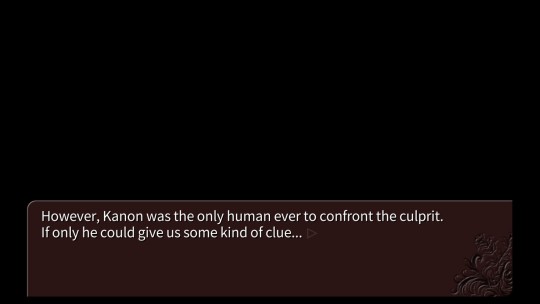
I like the use of the word “human” here. It really shows that Kanon managed to forego the shackles of furniture in his last moments.
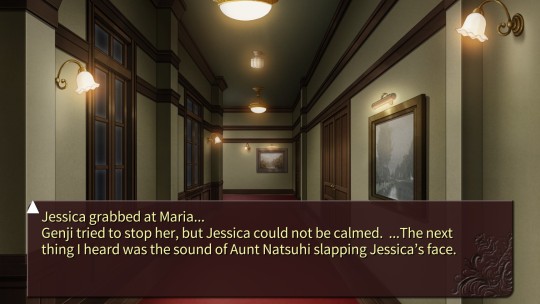
Back at it again with the beatings! It’s really pervasive in episode 1, huh?
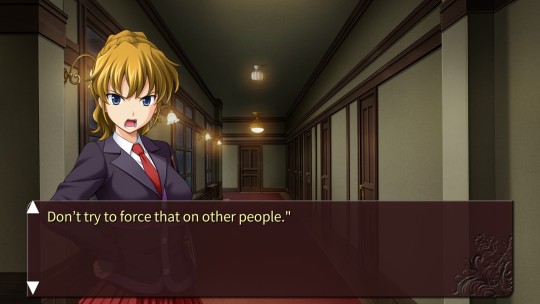
I’m glad that we’ve been getting more tempering of the use of fantasy as a coping mechanism in the latter half of Episode 1. Overall there’s been a good job of presenting this theme, and promoting it, but ensuring that it’s nuanced.

Oh this is a STELLAR line. Sly confession from Battler that he knew his logic against Eva was horseradish, but he went through with it anyway to defend Natsuhi. In a way, I guess you could even chalk this up to the use of fantasy to protect someone else, directly juxtaposing the untempered use a moment ago that was to the detriment of others.
Either way, this is Battler at his best, and I wish we got more of it in Episode 1.

I think there’s something to be said about how doomed the cast of Episode 1 is by the existence of Probatio diabolica - without something like the Red Truth to guide them, they get bogged down in the unknowns, and they’re unable to overcome the trials before them as a result.

Oh we’re still getting Kanji references? Ryukishi really wants you to re-examine the Epitaph, huh.

Kyrie from the past telling Battler why rotating the chessboard 360 degrees is getting him nowhere. They don’t really stress it, but the statement put forward here that “the opponent is acting emotionally, not rationally” is HUGE. It can be difficult gleaning what’s important and what isn’t on a first read through of any book - Umineko is an entirely different ballpark when it comes to that.

And the next line is literally talking about what if the opponent isn’t going for victory! We do a phenomenal job of sussing out what’s going on here, but since we don’t actually have any knowledge of the reasoning by the culprit, it all gets muddied and we continue to drown in dread.

Just like right now!
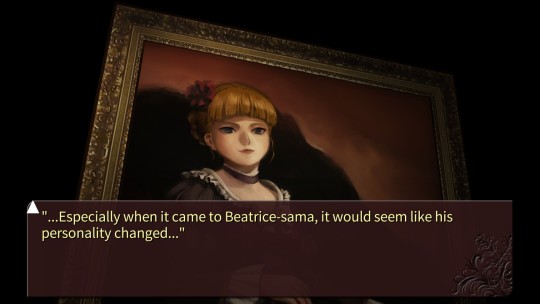
Interesting comment on Kinzo here - does that mean Maria’s sudden personality shifts are a reflection of her grandfather?
I get the impression that a lot of the stuff regarding apparent dual personalities will be recontextualised by future phases of Ciconia. Given how significant of a plot point it is in Phase 1, I feel like there are breadcrumbs here that will become more apparent or take on new meaning once Ryukishi dives into the concept in more detail, kind of like how the concept of gameboards helps to recontextualise Higurashi.

Interesting remark to make - I wouldn’t necessarily say that Yasu is influencing Genji, even if they are in cahoots, but rather Genji is acting on his own accord out of penance. But I suppose that could still be considered influence even if, to him, it’s of his own volition.

Once again, it’s shocking how many times Umineko tells you the answers but covers it up as a joke. I suppose there’s a joke to be made about how truth is stranger than fiction.

Great metaphor for the story as a whole - directly representative of the moment where it stops registering as a murder mystery horror tale, and instead is perceived as one about love. It’s actually kind of funny how, once you’ve uncovered the heart of the tale, the horror aspects seem to be completely non-consequential, yet they’re one of the most prominent things that new readers have to face.
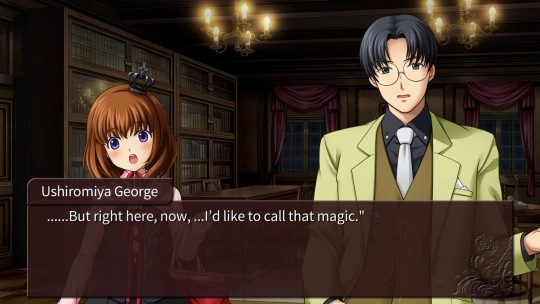
Magic is when other people engage in fantasy with you; a special concept where you mutually share a fabrication more palatable than the truth, where you can find comfort and solace in others in a way that makes life more tolerable. There’s an old saying that magic is just science that we don’t understand - but in this sense, magic is what we choose not to understand.
This scene also further emboldens my opinion that Maria is insufferable for the latter half of Episode 1. The “kihihihi” persona is extremely obnoxious and arguably dehumanising - I can understand the concept of retreating to a happier mindset to avoid confronting realities, but there’s not enough slipping through cracks for me to believe it here. You can’t convince me that Maria, as emotional as she is otherwise, can somehow turn it all off at a moment’s notice and flawlessly play an entirely different character who is unaffected by it all. I just don’t see it.
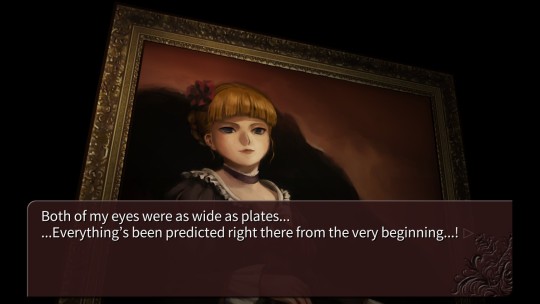
I have to say, there’s a few choice decisions made in Episode 1, but leaving this one so late as a “reveal” is by far the most insane. I don’t think there’s a single reader who makes it past the first twilight without going “oh, this is just like the epitaph”, so the fact that we’ve spent almost a third of Episode 1 between then and now before a character goes “WAIT A MINUTE” is absolutely crazy. I get that the scene as it is here gives a chance for the letter to be planted on the table, but surely we could have had this earlier (in either Chapter 11 or 12), modify the reactions to the other murders as the characters see the Epitaph progressing, and then maybe have them talk about it again here? I just find it unbelievable that we’ve gone so long without anyone picking up on it.

There’s something to be said about how, once you hit the endgame in chess, your moves are limited. Unfortunately, our party continues to make blunders even at this crucial intersection.
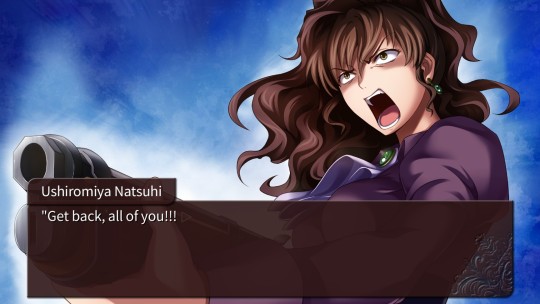
I’ve gushed a little bit about it before, but especially here, I love how the solution is entirely obvious but you’re STILL doubting yourself. Like yeah, there’s literally no other option here, someone in the room planted it while the backs were turned (or Natsuhi is lying about it, I suppose). But your mind is scrambling to find some alternative answer that’s there. Maybe magic is real, after all…

We’ve had Eva give Natsuhi the “what are you gonna do? Shoot me?” treatment, and now she’s getting it from a literal 9 year old as well. What a day!
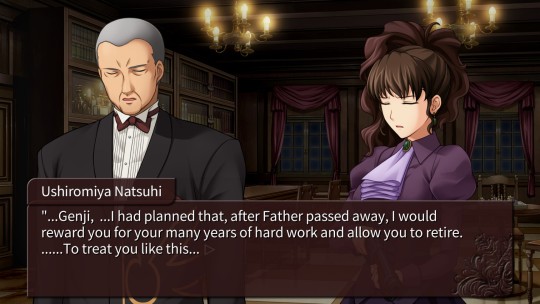
This line hits a lot harder with the knowledge that Kinzo is dead. Natsuhi absolutely feels remorse for what she’s doing - Genji should have retired years ago, but he had to stay to perpetuate the lie of Kinzo’s wellbeing, and now he’s being sent to his death despite remaining loyal after the curtain call. Good scene.

Oh yeah Battler? You’d never do something like that? I bet you’d never break a promise either, huh?

Thirty minutes to midnight - thirty minutes until everyone’s demise. Let the golden butterflies fly free.
3 notes
·
View notes
Text
Umireread: Legend of the Golden Witch - Chapter 14: Boiler Room
Sun, Oct 5 1986 - Indeterminate
The following contains spoilers for the entirety of Umineko. Please do not read if you are yet to finish it.

And we’re off… with another Wikipedia section.
I kind of let it slide last time, when they were talking about Maria and childhood development, but I want to take that back now. George lost both his parents in a horrific murder moments ago. There is absolutely no way he would be engaging in intellectual discussion about the specifics of locked room mysteries, in the same way that the trio shouldn’t have been going “this is also interesting from a sociological standpoint!” a couple hours after they saw their parents/love interest mutilated in an abhorrent murder scene. Bad writing.
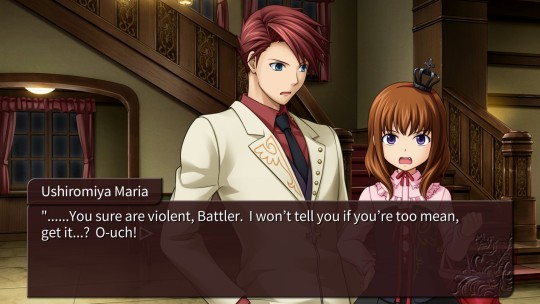
Gonna be real: this is fairly uncomfortable. It’s played lightheartedly, but hitting Maria several times, even semi-playfully, feels very inappropriate after the scene in the rose garden. None of these characters are acting anything like they should under the current circumstances.

This story is very obviously fictional and fantastical in nature.
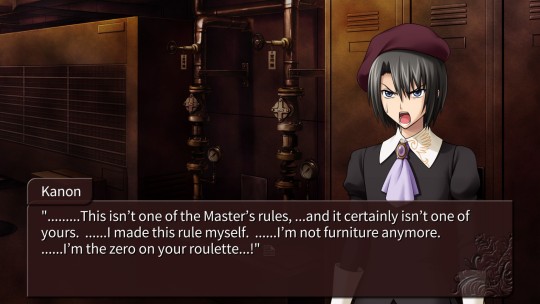
And so we get to the big scene. While the first twilight is my personal highlight of Episode 1, I’m pretty sure most people agree that this one is probably the most important.
So, Yasu throws away the title of furniture, and sacrifices the Kanon persona, knowing there is no turning back now - there’s no shortage of analyses for that. What really stood out to me here was the roulette discussion - it’s something that has been brought up quite a few times, as the concept of the Demons’ Roulette is pervasive throughout Umineko, but I haven’t had any major thoughts on it so far. Here, as the focus, I think the roulette is a reflection of the massacre as a whole.
Yasu wants to be stopped - but she, at this point, knows that’s almost certainly not going to happen. The family are too caught up in their own drama, they’re too self centred, their thoughts have turned to staying alive rather than solving the Epitaph. They want to solve the murders, but they’re not on the right wavelength to understand Yasu. Her motive is inscrutable, her methods esoteric. The Ushiromiya family is doomed. The roulette is red or black.
She, however, is the zero on the roulette. Yasu is the green. When Kinzo spoke earlier of the high risk, high reward of the roulette, this is what he meant - either everyone dies, Yasu gets her revenge, we see the likely outcome of red or black. But if someone solves the Epitaph - if someone understands Yasu - if someone discovers her, this extra spot on the roulette, they win. And she wants to be understood. By someone - anyone. She wants them to win.
Beatrice’s game is one where she always wins; she casts a dice and cares not for the result, as she is content with any. If the roulette is red or black, the house wins, she profits. But if the house loses - and the family are rewarded with their 10 ton payout - she still wins. Because she has traded all the gold for an honour that no money could ever buy.

Man, it always feels unfortunate when I have to go directly from making a deep point to a more surface level observation, or comedic note - but I do like the consistent use of “makeup” across the murders. Very funny when it’s quite literal for the faked deaths. But even for the real bodies - earth to earth - it adds this layer of doubt and fantasy to the level which should have none.

Yasu has had little control in her life. She has suffered because of the actions of others, from the moment of her conception to where she is now. The events of October 4 and 5 - presuming the roulette hits red or black - is a final gambit to wrestle control back from the world that denied her. And just as Yasu decides to go out on her own terms, Kanon wrestles the stake from his chest, a final action that gives him the say in his own demise. It is an act of agency - an act of one who is no longer furniture.
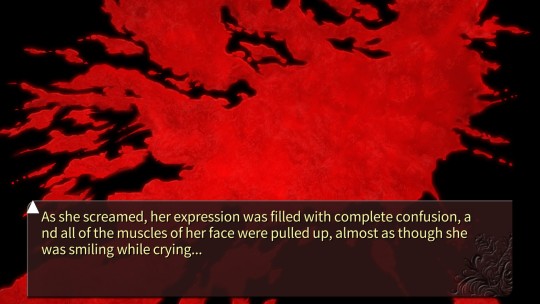
Kumasawa, once again, is having WAY too much fun with this. She can’t even hide the smile this time.
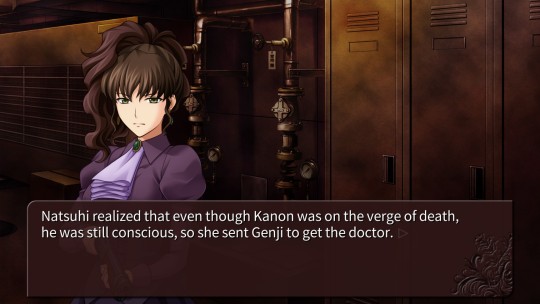
I think there’s something to say about the Ushiromiya pride being their downfall here - bodies are dirty. They don’t want to disgrace their own hands with them. They must send for the doctor so that they may make the inspection. If any of them had taken a pulse, checked for themselves, or even tried to rush to assist - the plan would be over. But Yasu knows that these people will fall prey to the fantasy. Why would they help her? No-one ever has. This must have been cathartic to write.
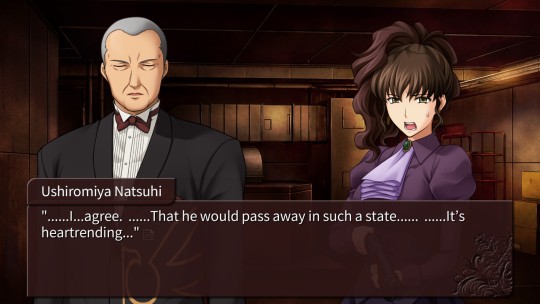
So given the Kinzo situation, this must be the moment that Natsuhi immediately clocks the servants as being culpable. Being aware of what she knows, and aware of what she knows they know, contextualises a lot of her upcoming jitteriness towards them.
You know, we haven’t had Kanon’s death tip yet. I suppose it might be because they’re going with the whole “he could be alive in Nanjo’s office”, but it’s another cute little hint that something’s off here.
Oh we have it again with the characters going off about the history of polydactyly in the family. Umineko is at its best when we are really feeling the human behind these characters. It’s at its worst when they’re listing off facts in a scientific manner right after someone close to them just died.
Oh yeah we get Kinzo’s death tip before Kanon’s. This scene is so suspicious before you even start to really think about it.

So that means Krauss and Shannon are in the clear, right? After all, we saw Krauss with half a face, and Hideyoshi told us that Shannon was there with half a face as well. It’s a good thing that there are no co-conspirators here who would lie to us to preserve the mystery.
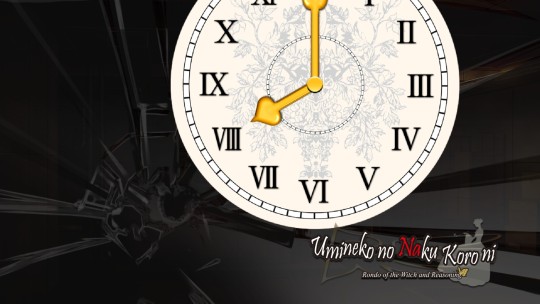
Oh, the clock’s getting bigger as we progress through the Epitaph. I like that a lot. Very imposing.
6 notes
·
View notes
Text
Umireread: Legend of the Golden Witch - Chapter 13: The Two Who Are Close
Sun, Oct 5 1986 - 7:00PM
The following contains spoilers for the entirety of Umineko. Please do not read if you are yet to finish it.
And so we open once again on the servants. Similar to the last one we had, this one feels weird to me - fantasy scenes feel best when they’re partially true, having different connotations depending on how you read it (e.g. early scenes where you can read it as one of Shannon or Kanon being absent, Kinzo study scenes), or full fabrications like the fantasy murders we have to look forward to in future episodes. I’m not particularly gleaming anything interesting here - there’s some ruminating from Kanon over Shannon, but Genji and Nanjo talking about “where did Kinzo go? I hope we aren’t killed” doesn’t really contribute anything meaningful beyond misdirection as far as I’m aware.

It’s tempered immediately by the next line, but “he had approved of it instantly” is such a funny thing to say. “Babe, do you want to put a baby in me?” “YES MA’AM!”
I have to say, I feel that the writing here - giving characters big emotional moments right before they’re killed off - is a little… basic? Again, it’s the whole “he was one day from retirement” thing - it’s very cheap to add details like that to elicit more of an emotional response. It’s the kind of thing you’d expect in third-rate literature, not Umineko.

Episode 1 (and soon to be Umineko at large) has been dwelling a lot on having characters reduced to plot devices; humans muted down to digestible aspects. Eva here is dismissing Shannon as just “some servant girl”, completely ignoring the person that lies behind that interpretation. We’ve already seen it quite a bit with the layout of the family at the dinner table, the references to women being borrowed wombs for the family, and both George and Jessica being observed as successors to the family rather than kids with their own hopes and dreams outside of it.
I think part of this is indeed a parallel to Yasu’s thoughts on being perceived as furniture - after all, if that’s what she has been reduced to, why should the same not be true for others? However, I think it’s also reflective of the meta commentary of literature as a whole. In forgeries by less talented writers, this is exactly what happens - they fail to comprehend the infinite intricacies that lie behind every human, and unable to capture that with the skills that they lack, they reduce the characters to tropes or traits that they can portray at the cost of their humanity. Shannon is just some servant girl. Eva is just a girlboss. I’m just someone writing their thoughts on a visual novel. Why would there be anything more than that?

Yeah they really are leaning in to the “killed 2 days before retirement” angle, huh.
I’m hesitant to dismiss every case of hacky writing as being intentional from Yasu. Ryukishi’s work is phenomenal, but he’s not some sort of omnipotent savant who is actually writing 5 levels of meta around each moment of weak writing. Is Yasu, as a writer, unlikely to be proficient, and prone to resorting to cheap techniques? Yes, I’d say so. Is every moment like this an intentional reflection of that? I heavily doubt it. Unless there was a line where Shannon/Kanon was talking about writing as a hobby, and how they had a tendency to fall into cliches, I think we can just say this is weak stuff and move on.
That aside, I do think it’s worth pointing out that this scene is them talking about going on a fancy holiday to celebrate the new years. Almost like they’re about to inherit a good sum of money - as if they’d been offered parts of the 10 tons of gold for their assistance in the ongoing mystery - eh?
Moving on from the two who are close, we return to more suffering with Natsuhi. After dealing with everything else, she’s now thrust into a stressful leadership position, which no doubt exacerbates her problems. How unfortunate for her.

Once again, this is something only the servants could have done - but thanks to Battler Chessboard-thinking himself out of the answer, it doesn’t feel overly obvious.
I want to bring up the North Wind and the Sun again here, since I feel it’s relevant - with how much that fable has been pushed already, there’s no doubt that it’s a reflection of what’s going on. The game is telling you it is the servants. By all reasonable logic, it MUST be the servants. But that’s what the North Wind is telling you - so you grip your coat, you fight against it, you look for answers that prove it wrong. It’s only when the sun shines from the Golden Land, when you arrive at the answers yourself, that you let down your coat that insulates you from the truth.

I’ve clocked the use of “proved” here in white text that’s reminiscent of when Shannon having only half her face caved in “proved” that her body was real. I think this is another word to keep an eye out for - every time the white says it has “proved” something, should we be assuming the opposite?
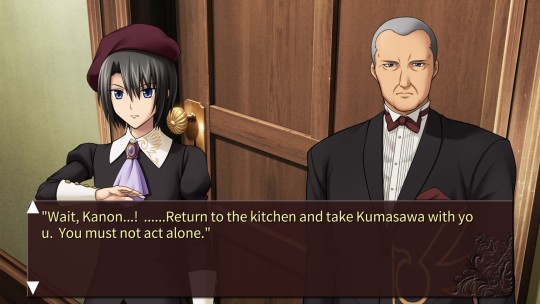
While we know that the rigmarole with the chain is a fabrication, this line from Genji feels real - beyond being the veteran servant, Genji almost feels like a mastermind in this scene, supporting Yasu and making sure everything sticks to the plan. Don’t go alone - bring someone with you to make sure you have a tighter alibi, so that fingers can’t be pointed as readily. The fact that Genji said this out of “wariness” doubles down on this read.
In a sense, this confidence of the servants abiding to “don’t go alone, travel in pairs” also shows how mechanical they are with their approach to the whole situation. While the non-culprits are flailing and don’t know what to do, those responsible are sticking to the script and holding up remarkably well. There’s a clear divide between those who are lost in Episode 1 and those who have adapted, and it’s not hard to see what that line dividing them is.

There’s something to be said about how antagonistic the Umineko narrative is as a mystery, with the constant lies at every corner.
If it was simply using these stratagems as a gotcha, to be a difficult mystery for a reader to solve, this would be a terrible story. It’s the reasoning behind these antagonistic choices that makes Umineko the piece of literature that it is. I know lots of people who get frustrated at the antagonistic elements, who feel that the story is making fun of them, and conclude that it’s a bad story as a result. I hope that those people can one day return to it, overcome their presumptions, and see what the story really has to say about those elements.
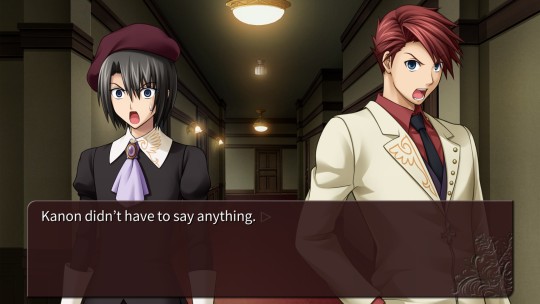
And Kanon steals the award of “best facial expression” for Episode 1, it’s not even close. Beatrice sure does get the best expressions of everyone, huh?
And with George, we’re really cementing the themes of loss of innocence across Episode 1 - we’ve had all the kids reacting viscerally to losing their parents (well, except maybe Maria, unless you want to view her as having retreated fully into fantasy as a coping mechanism). I feel there’s a parallel to be drawn here between the loss that Yasu suffered - just as her innocence was forcibly stricken from her, so too have all the cousins been met with a fate more cruel than what they deserved. In a sense, those who have died are the fortunate ones; it is those who are left behind, who must deal with the grief, who are the unfortunate ones. And is that not how Yasu feels about her life as a whole?
I do wonder how, as Kanon, Yasu feels when she sees everyone so pained by these events. After all, the three older cousins are all potential love interests for her, so it’s not like she’s disinterested to their suffering. I feel like I would have liked to have seen the mask slip - for her to break down every so briefly at the others’ grief, even if painted as grief for Shannon; or if that would be too improper for furniture, then perhaps to have seen that in one of those servants-only scenes that didn’t have much else going for them. As with the discussion of Shannon being “some servant girl”, you lose so much of Yasu if you paint her as a coldhearted serial killer who has no emotions regarding what she does. I wish we had a little more of her here.
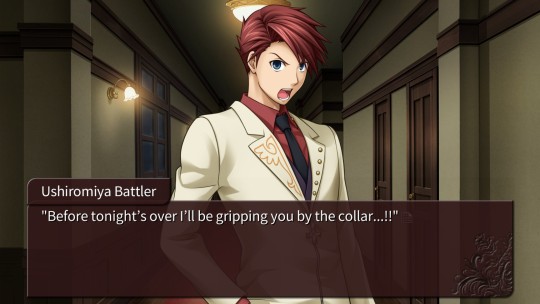
Hey, so remember that one comment we put to the side last chapter?
Well, great news Battler, you already have.
Unironically I feel like this might be one of the biggest hints for Episode 1 if you go back and read through it like a hawk - I’m not sure if Battler grabs anyone else by the collar in this episode, so it basically confirms the culprit, especially given Kanon is easily the most suspect from everything else going on.

And this chapter just fades to black instead of giving us the usual screen. Very odd. I’m not entirely sure why it does this - obfuscating the time could be useful for opening up more options on the mystery side of things, but given Kanon’s upcoming death is already the most suspect part of Episode 1, casting more uncertainty on it feels unnecessary?
I suppose it might be because we’re not jumping forward and continuing almost immediately from the last scene, but you still could have thrown up the fancy banner to mark the chapter end. Maybe this was originally a single, long chapter, retroactively broken here to split it up? Either way, I don’t think there’s anything meaningful to be gleaned from this transition, so let’s keep pressing forward. Or space bar, I suppose.
4 notes
·
View notes